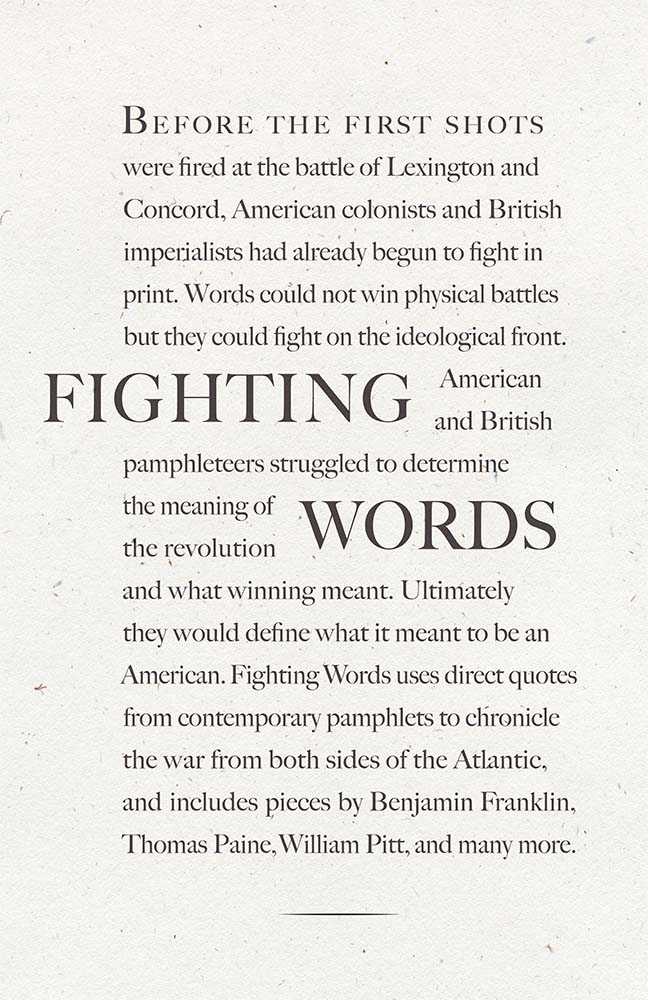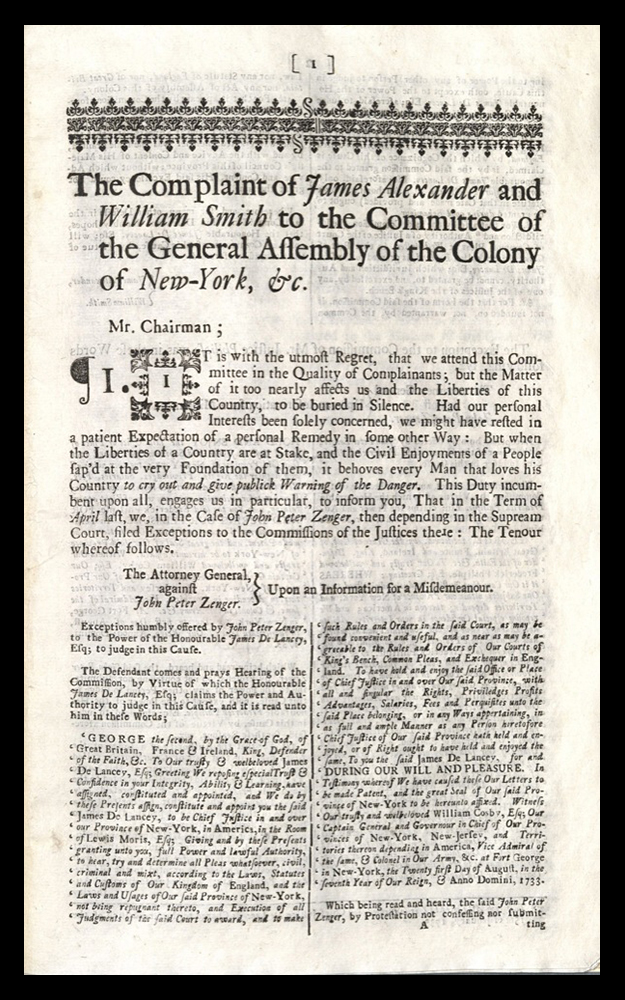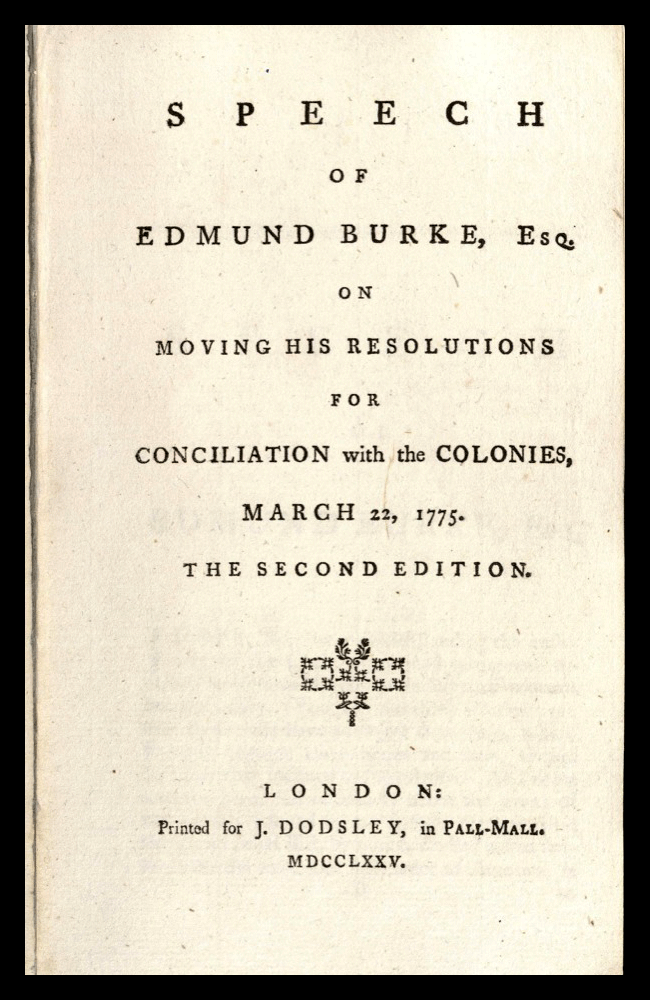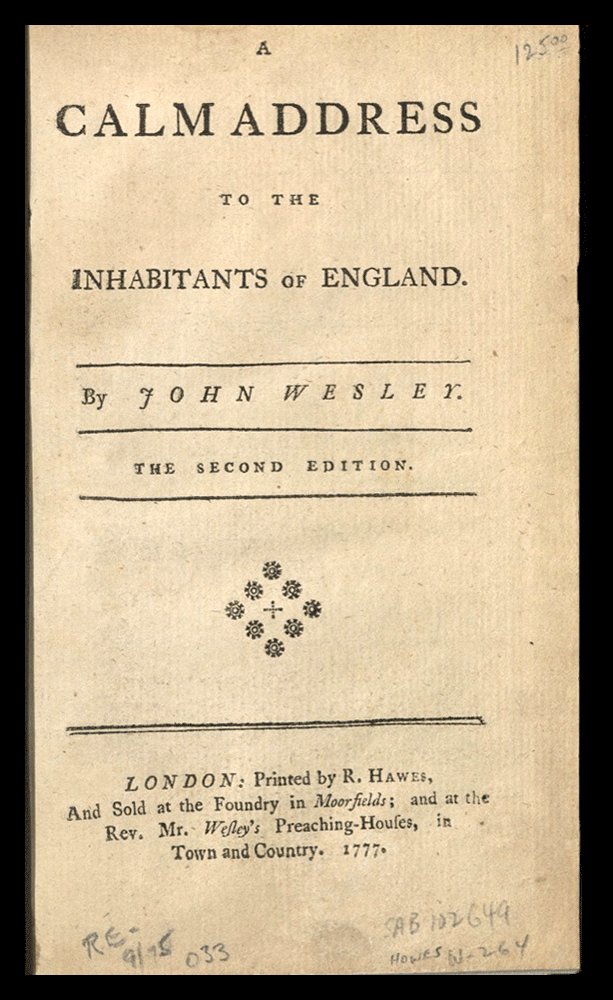Fighting Words:
American Revolutionary War Pamphlets
Checklist for "Fighting Words"
Curated by Alison Elbrader, 2012
Exhibition poster designed by David Wolske, 2012
Digital exhibition produced by Alison Elbrader, 2013
Before the first shots were fired at the battle of Lexington and Concord, American colonists and British imperialists had already begun to fight in print. Words could not win physical battles but they could fight on the ideological front. American and British pamphleteers struggled to determine the meaning of the revolution and what winning meant. Ultimately they would define what it meant to be an American. Fighting Words uses direct quotes from contemporary pamphlets to chronicle the war from both sides of the Atlantic, and includes pieces by Benjamin Franklin, Thomas Paine, William Pitt, and many more.
“It is with utmost Regret, that we attend this Committee in the Quality of Complaints; but the Matter of it too neatly affects us and the Liberties of this Country, to be buried in Silence. Had our personal Interest been solely concerned, we might have rested in a patient Expectation of a personal Remedy in some other Way: But when the Liberties of a Country are at Stake, and the Civil Enjoyments of a People sap’d at the very Foundation of them, it behoves every Man that loves his Country to cry out and give publick Warning of the Danger.”
New York: Printed by John Peter Zenger, 1735
First edition
KF223 Z4 1735
“They acknowledge Dependance upon their Mother Country; but that Dependance would be Slavery not Connection, if they bore no Part in the Government of the whole: they would then indeed be in a worse Situation than the Inhabitants of Britain, for these are all of them virtually, tho’ few of them are actually represented in the House of Commons; if the Colonies were not, they could not expect that their Interest and their Privileges would be any otherwise considered there, than as subservient to those of Great Britain;…Happily for them, this is not their Condition. They are on the contrary a Part, and an important Part of the Commons of Great Britain: they are represented in Parliament, in the same Manner as those Inhabitants of Britain are, who have not Voiced in Elections; and they enjoy, with the Rest of the Fellow-subjects, the inestimable Privilege of not being bound by any Laws, or subject to any Taxes, to which the Majority of the Representatives of the Commons have not consented.”
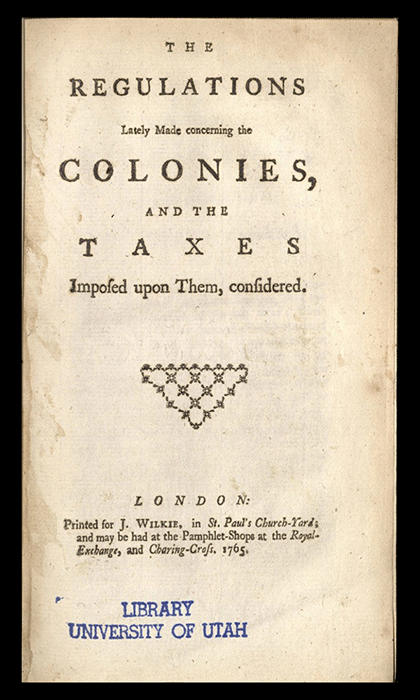
THE REGULATIONS LATELY MADE CONCERNING THE…
Thomas Whately (d. 1772)
London: Printed for J. Wilkie, 1765
E215.2 W5
Thomas Whately (d. 1772)
London: Printed for J. Wilkie, 1765
E215.2 W5
“The Colonies claim the Privilege, which is common to all British Subjects, of being taxed only with their own consent given by their Representatives, and all the Advocates for the Stamp Act admit this Claim. Whether, therefore, upon the whole Matter, the Imposition of the Stamp Duties is a proper Exercise of Constitutional Authority, or not, depends upon the single Question, Whether the Commons of Great Britain are virtually the Representatives of the Commons of America, or not.” – August 1765
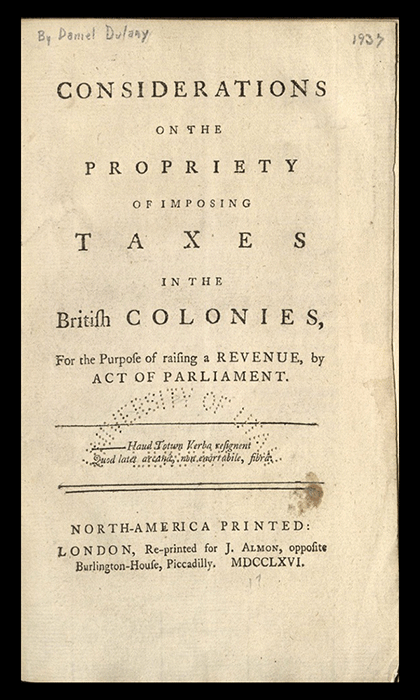
CONSIDERATIONS ON THE PROPRIETY OF IMPOSING…
Daniel Dulany (1721-1797)
North-America printed: London: Re-printed for J. Almon, 1766
Second edition
E211 D877
Daniel Dulany (1721-1797)
North-America printed: London: Re-printed for J. Almon, 1766
Second edition
E211 D877
“Upon the Whole, I beg leave to tell the House what is my real Opinion: It is that the S--p A-- be repealed absolutely, totally and immediately. That the Reason of the Repeal be assigned, because it is founded upon erroneous Principles; at the same Time let the sovereign Authority of this Country over the Colonies be asserted in as strong Terms as can be advised – and be made to extend to every Point of Legislation whatsoever: That we may bind their Trade, confine their Manufactures, and exercise every Power whatsoever, except that of taking their Money out of their Pocket without their Consents.” – 17 December 1765
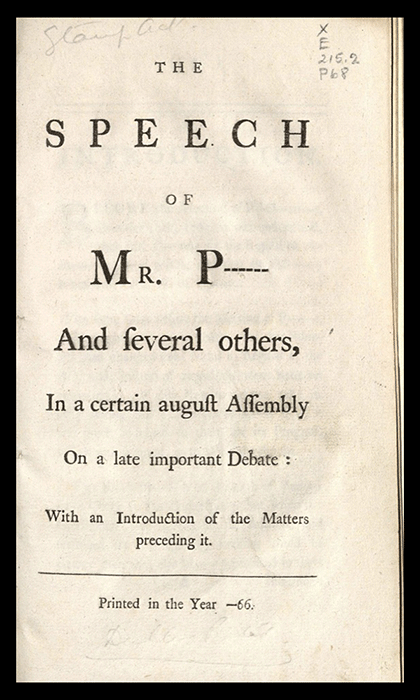
THE SPEECH OF MR. P------- AND OTHERS, IN A CERTAIN…
William Pitt (1708-1778)
[London?], Printed in the year --66 [1766]
E215.2 P68
William Pitt (1708-1778)
[London?], Printed in the year --66 [1766]
E215.2 P68
“There is an idea in some, that the colonies are virtually represented in this house. I would fain know by whom an American is represented here? Is he represented by any knight of the shire, in any county in this kingdom? – The idea of a virtual representation of America in this house, is the most contemptible idea that ever entered into the head of a man – It does not deserve a serious refutation” – January 1766, William Pitt
“Protection and obedience are reciprocal. Great Britain protects America; America is bound to yield obedience. If not, tell me where the Americans were emancipated? When they want the protection of this kingdom, they are always very ready to ask it. That protection has always been afforded them in the most full and ample manner. The nation has run itself into an immense debt to give them their protection; and now they are called upon to contribute a small share towards the public expence, an expence arising from themselves, they renounce your authority, insult your officers, and break out, I might almost say, into open rebellion... Ungrateful people of America!” – Mr. Granville in response
“Protection and obedience are reciprocal. Great Britain protects America; America is bound to yield obedience. If not, tell me where the Americans were emancipated? When they want the protection of this kingdom, they are always very ready to ask it. That protection has always been afforded them in the most full and ample manner. The nation has run itself into an immense debt to give them their protection; and now they are called upon to contribute a small share towards the public expence, an expence arising from themselves, they renounce your authority, insult your officers, and break out, I might almost say, into open rebellion... Ungrateful people of America!” – Mr. Granville in response
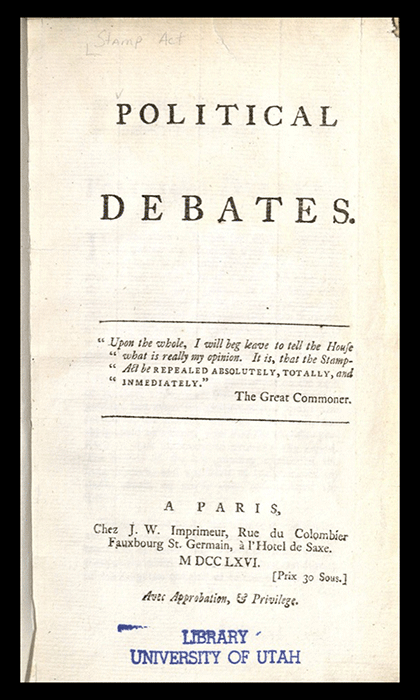
“The time has been when the colonies would have esteemed it a great advantage, as well as honour to them, to be permitted to send members to parliament; and would have asked for that privilege, if they could have had the least hopes of obtaining it. The time is now come, when they are indifferent about it, and will probably not ask it; though they might accept it if offered them; And the time will come, when they will certainly refuse it.” – 6 January 1766, Letter concerning the Gratitude of America, and the probability and effect of an Union with Great Britain; and concerning the Repeal or Suspension of the stamp-Act
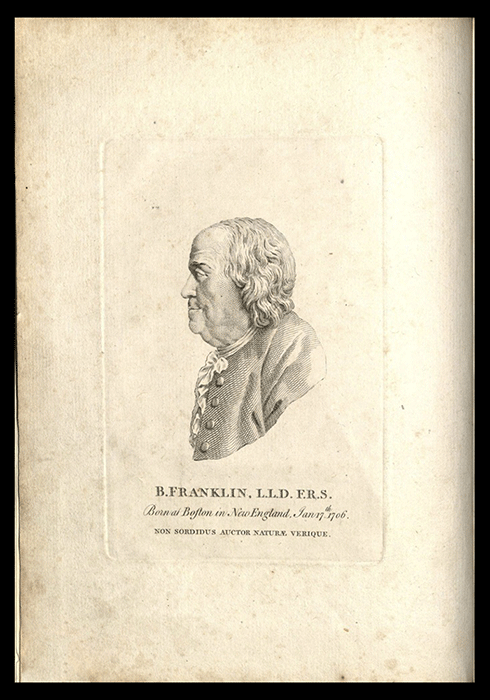
POLITICAL, MISCELLANEOUS, AND PHILOSOPHICAL PIECES...
Benjamin Franklin (1706-1790)
London: Printed for J. Johnson, 1779
First edition
E302 F83 1779
Benjamin Franklin (1706-1790)
London: Printed for J. Johnson, 1779
First edition
E302 F83 1779
“Q. What used to be the pride of the Americans?
A. To indulge in the fashions and manufactures of Great-Britain.
Q. What is now their pride?
A. To wear their old cloaths over again, till they can make new ones.” – February 1766
A. To indulge in the fashions and manufactures of Great-Britain.
Q. What is now their pride?
A. To wear their old cloaths over again, till they can make new ones.” – February 1766
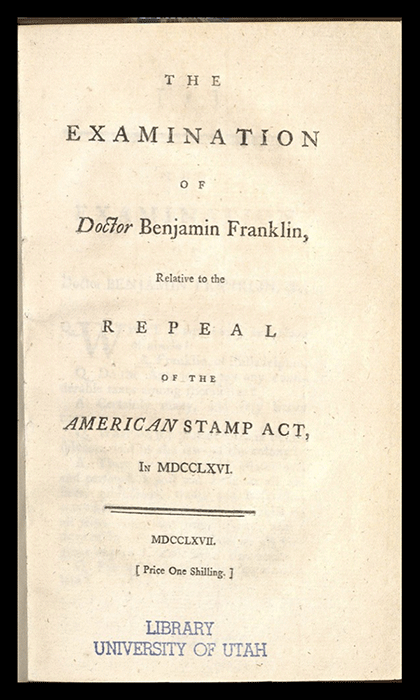
“I now partake no less in your common joy, on account of the REPEAL of that act; whereby these colonies are emancipated from a slavish, inglorious bondage; are re-instated in the enjoyment of their ancient rights and privileges, and a foundation is laid for lasting harmony between Great-Britain and them, to their mutual advantage.” – 23 May 1766
“Under all these Pressures and Calamities, your deluded Countrymen will certainly open their Eyes at last. For Disappointments and Distresses will effectuate that Cure, which Reason and Argument, Lenity and Moderation could not perform. In short, having been severely scourged and disciplined by their own Rod, they will curse their ambitious Leaders, and detest those Mock-patriots, who involved them in so many Miseries. And having been surfeited with the bitter Fruits of American Republicism, they will heartily wish, and petition to be again united to the Mother Country. Then they will experience the Difference between a rational Plan of Constitutional Dependence, and the wild, romantic, and destructive Schemes of popular Independence.
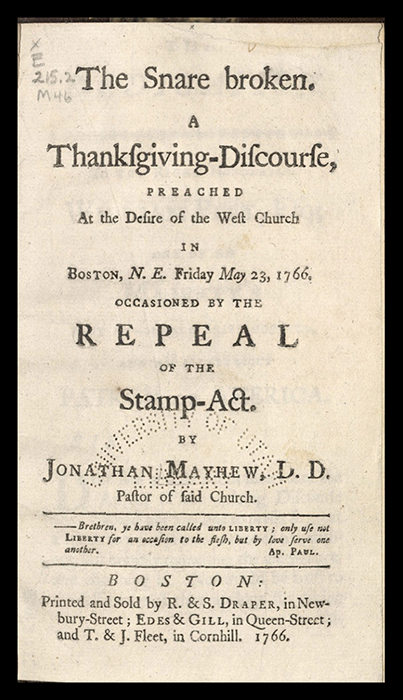
THE SNARE BROKEN. A THANKSGIVING DISCOURSE…
Jonathan Mayhew (1720-1766)
Boston: Printed and sold by R. & S. Draper, Edes & Gill, and T. & J. Fleet, 1766
E215.2 M46
Jonathan Mayhew (1720-1766)
Boston: Printed and sold by R. & S. Draper, Edes & Gill, and T. & J. Fleet, 1766
E215.2 M46
"And you, my Boy, after you have played the Hero, and spoke all your fine Speeches; -- after you have been a Gustavus Vasa, and every other brave Deliverer of his Country; -- after you have formed a thousand Utopian Schemes, and been a thousand times disappointed; -- perhaps even you may awake out of your present political Trance, and become a reasonable Man at last. And assure yourself, that whenever you can be cured of your present Delirium, and shall betray no Symptoms of a Relapse, you will be received with Affection by your old Uncle…”
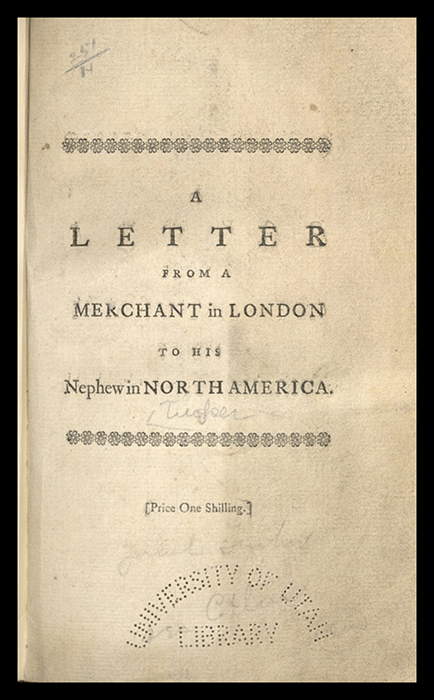
LETTER FROM A MERCHANT IN LONDON TO HIS NEPHEW...
Josiah Tucker (1712-1799)
London: Printed for J. Walter, 1766
E211 T85
Josiah Tucker (1712-1799)
London: Printed for J. Walter, 1766
E211 T85
“Did the Difficulty in this Argument conflict in the Dubiousness of the Fact, ‘Whether Wars were destructive to Mankind or not,’ that Difficulty would not long subsist; for, if ocular Demonstration can be allowed to be Proof, it is but too manifest, That both the conquering, and the conquered Countries, are prodigious Losers by them.” – Tract II, The CASE of going to War; being a Fragment of a greater Work
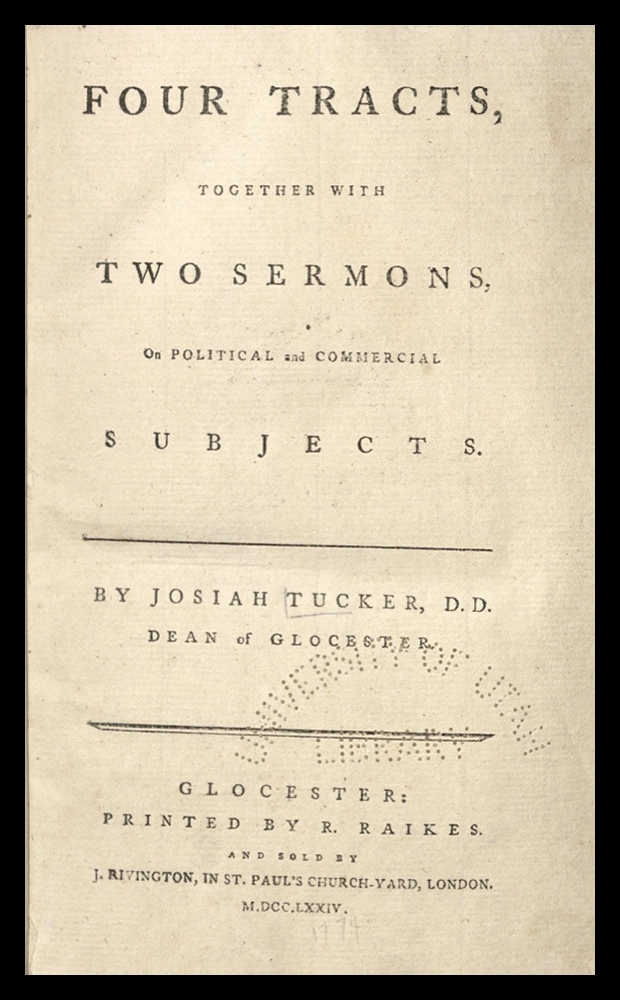
FOUR TRACTS, TOGETHER WITH TWO SERMONS…
Josiah Tucker (1712-1799)
Glocester: R. Raikes; 1774
First edition
E211 T85
Josiah Tucker (1712-1799)
Glocester: R. Raikes; 1774
First edition
E211 T85
“A very strange Notion is now industriously spreading, that ‘till the late unhappy Stamp-Act, there were no Bickering and Discontents, no Heartburnings and Jealousies subsisting between the Colonies and the Mother Country. It seems ’till that fatal Period, all was Harmony, Peace, and Love. Now it is scarcely possible even for the most superficial Observer, if his Knowledge extends beyond the Limits of a Newspaper, not to know, That this is entirely false.” – Tract IV, The true interest of Great-Britain set forth in regard to the colonies; and the only means of living in peace and harmony with them
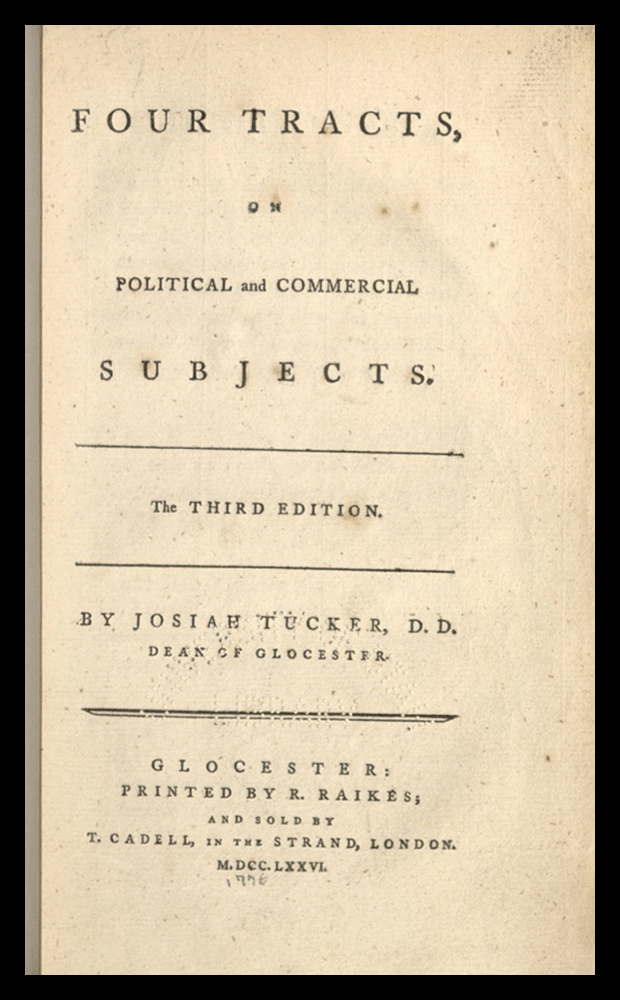
FOUR TRACTS ON POLITICAL AND COMMERCIAL SUBJECTS
Josiah Tucker (1712-1799)
Glocester: R. Raikes, 1776
Third edition
E211 T85 1776
Josiah Tucker (1712-1799)
Glocester: R. Raikes, 1776
Third edition
E211 T85 1776
“WHEREAS the Merchants and Traders of the Town of Boston, and almost all the Maritime Towns on the Continent, from a principle truly noble and generous, and to the sacrificing of their own private Interests, have entered into an Agreement not to import British Goods (a few necessary Articles excepted) until the Act of Parliament imposing certain Duties on Tea, Glass, Paper, Painters Colours, Oyl, &c. for the express Purpose of raising a Revenue in America, be repealed; which Agreement, if strictly adhered to, will not fail to produce the most salutary Effects. Therefore,
…VOTED, That we do with the utmost Abhorrence and Detestation, view the little, mean and sordid Conduct of a few Traders in this Province, who have and still do import British Goods contrary to said Agreement, and have thereby discovered that they are governed by a selfish Spirit, and are regardless of, and deaf to, the Miseries and Calamities which threaten this people.
VOTED, That whereas John Barnard, James McMasters, Patrick McMasters, John Mein, Nathaniel Rogers, William Jackson, Theaophilus Lulie, John Taylor, and Ame & Elizabeth Cummings, all of Boston; ,Israel Williams Esq; & Son of Hatfield; & Henry Barnes of Marlboro’, are of these Number; and do import contrary to said Agreement: We do hereby declare, that we will not buy the least Article of any of said persons ourselves, or suffer any acting for or under us, to buy of them; neither will we buy of those that shall buy or exchange any articles of Goods with them.
VOTED, That to the End of Generations which are yet unborn, may know who they were that laughed at the Distresses and Calamities of this people; and instead of striving to save their Country when in imminent Danger, did strive to render ineffectual a virtuous and commendable Plan; the Names of these Importers shall be annually read at March Meetings.” – 12 March 1770
…VOTED, That we do with the utmost Abhorrence and Detestation, view the little, mean and sordid Conduct of a few Traders in this Province, who have and still do import British Goods contrary to said Agreement, and have thereby discovered that they are governed by a selfish Spirit, and are regardless of, and deaf to, the Miseries and Calamities which threaten this people.
VOTED, That whereas John Barnard, James McMasters, Patrick McMasters, John Mein, Nathaniel Rogers, William Jackson, Theaophilus Lulie, John Taylor, and Ame & Elizabeth Cummings, all of Boston; ,Israel Williams Esq; & Son of Hatfield; & Henry Barnes of Marlboro’, are of these Number; and do import contrary to said Agreement: We do hereby declare, that we will not buy the least Article of any of said persons ourselves, or suffer any acting for or under us, to buy of them; neither will we buy of those that shall buy or exchange any articles of Goods with them.
VOTED, That to the End of Generations which are yet unborn, may know who they were that laughed at the Distresses and Calamities of this people; and instead of striving to save their Country when in imminent Danger, did strive to render ineffectual a virtuous and commendable Plan; the Names of these Importers shall be annually read at March Meetings.” – 12 March 1770
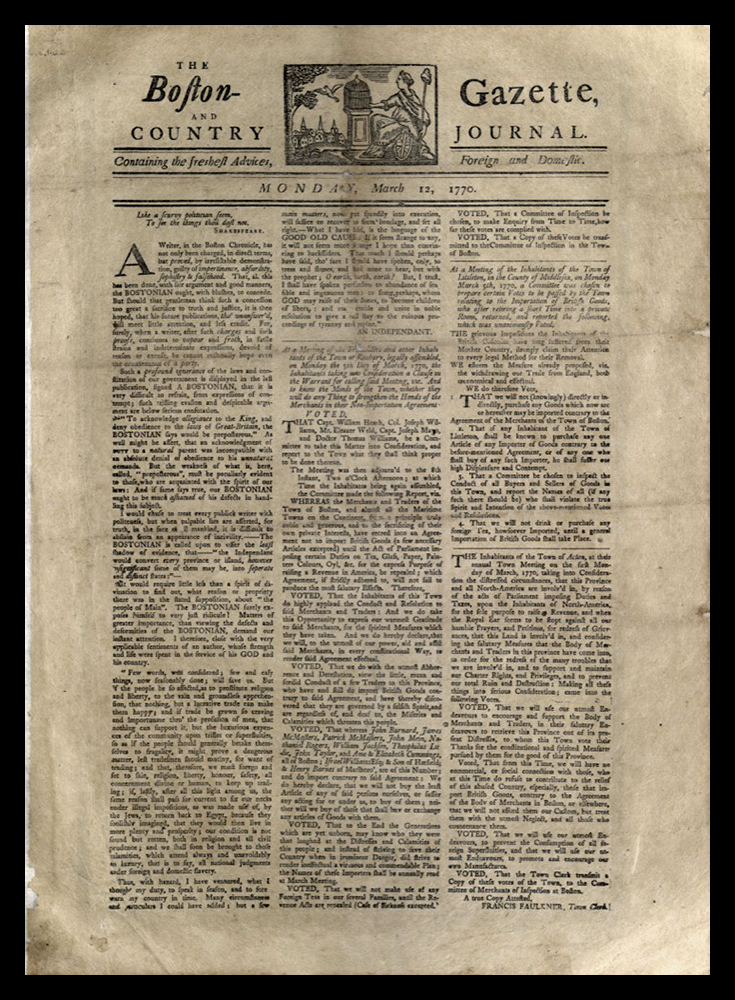
THE BOSTON GAZETTE
Boston: B. Edes and J. Gill, 1755-1793
AN2 M4 B67
“When a Community, great or small, think their Rights and Privileges infringed, they will express their Uneasiness in a Variety of Ways: some of which may be highly improper, and criminal. So far as any of an atrocious Nature have taken Place, we would express our Abhorrence of them: and as we have always done hitherto, we shall continue to do, every Thing in our Power to discourage and suppress them. But it is in vain to hope that this can be done effectually so long as the Cause of the Uneasiness, which occasioned them, exists. – 25 January
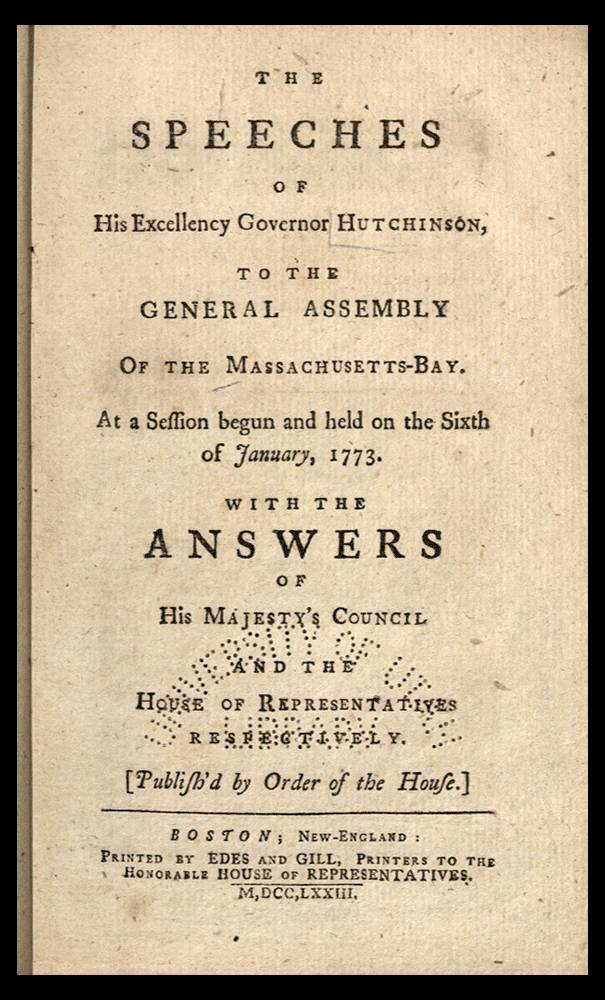
THE SPEECHES OF HIS EXCELLENCY GOVERNOR…
Thomas Hutchinson (1711-1780)
Boston: Printed by Edes and Gill, printers to the honorable House of representatives, 1773
J87 M417 1773
Thomas Hutchinson (1711-1780)
Boston: Printed by Edes and Gill, printers to the honorable House of representatives, 1773
J87 M417 1773
“The true object of all our deliberations on this occasion, which I hope we shall never lose sight of, is a full and cordial reconciliation with North America. Now I own, my Lords, I have many doubts whether the terrors and punishments, we hang out to them at present, are the surest means of producing this reconciliation. Let us at least do this justice to the people of North America to own, that we can all remember a time when they were much better friends than at present to their mother country. They are neither our natural nor our determined enemies. Before the Stamp Act, we considered them in the light of as good subjects as the natives of any county in England.
It is worth while to enquire by what steps we first gained their affection, and preserved it so long; and by what conduct we have lately lost it. Such an enquiry may point out the means of restoring peace, and make the use of force unnecessary against a people, whom I cannot yet forbear to consider as our brethren.”
It is worth while to enquire by what steps we first gained their affection, and preserved it so long; and by what conduct we have lately lost it. Such an enquiry may point out the means of restoring peace, and make the use of force unnecessary against a people, whom I cannot yet forbear to consider as our brethren.”
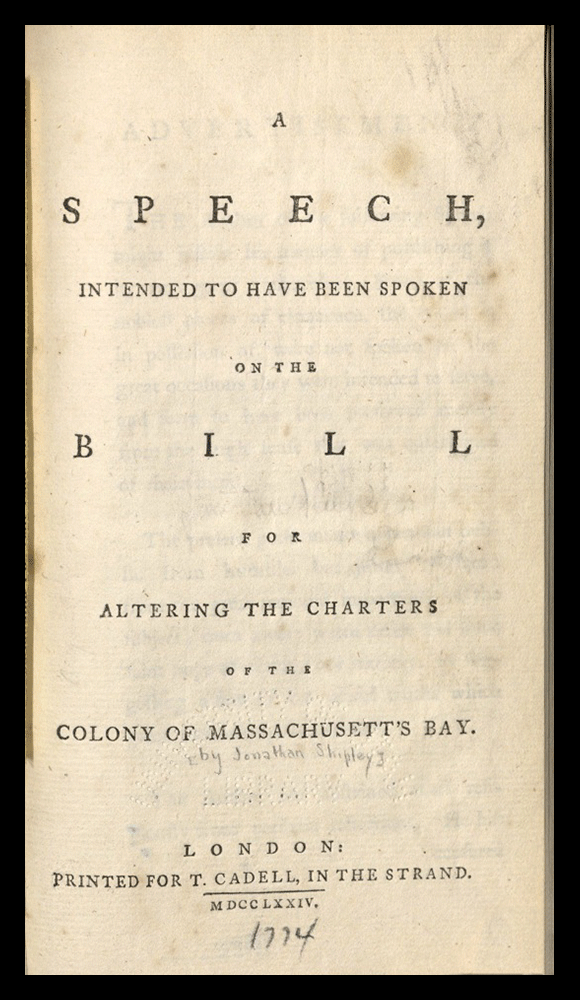
Jonathan Shipley (1714-1788)
London: Printed for T. Cadell, 1774
Fourth edition
E211 S55 1774
London: Printed for T. Cadell, 1774
Fourth edition
E211 S55 1774
“The inhabitants of our colonies in North America are supposed to consist of about two millions of persons; they occupy and possess a very extensive territory, much larger than Great Britain; …they have felled the forests; they have cleared and tilled the land, they have planted it, they have sown it, they have stocked it with cattle; they have built themselves houses; they have entered into exchange and commerce; they have spared and saved for a future day or for their families; they have by many and various means acquired many and various sorts of property; they are by nature entitled to welfare and happiness, and to seek and pursue those blessings,… they have for that end a right to freedom in their governments and to security in their persons and properties; none are warranted to deprive or dispossess them of these things; should on the contrary one man or a body of men advance any claim, which tended to enslave all the persons or to unsettle all the property of this great community, to divest them of every thing, which they possess and to leave them nothing, which they could call their own, of all that they have thus inherited earned or acquired; the very enormity, the evil and unnatural consequences of such a proposition would of themselves sufficiently shew its absurdity, weakness and unreasonableness.”
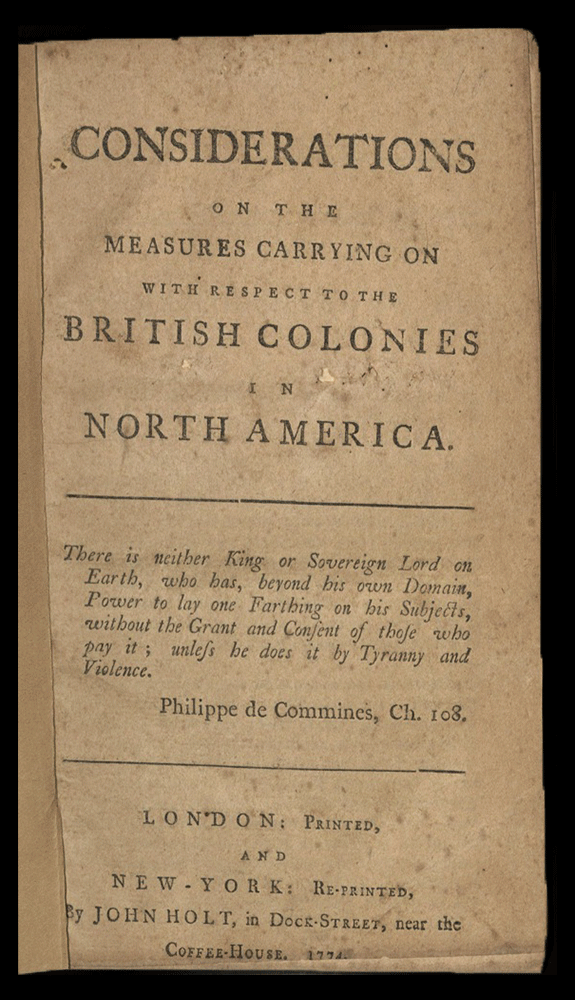
Matthew Robinson-Morris Rokeby (1713-1800)
London printed, New York re-printed: by John Holt, 1774
Second edition
E211 R746
London printed, New York re-printed: by John Holt, 1774
Second edition
E211 R746
“… when the Natural Rights of any of our fellow-subjects are apparently at stake, every man has a right to judge for himself, and to declare his sentiments, as far as plain conclusions of reason and common-sense will fairly warrant; and such only are referred to in the following Declaration of the Natural Right of popular Representation in the legislature.
And as all British subjects, whether in Great-Britain, Ireland, or the Colonies, are equally free by the law of ,Nature, they certainly are equally entitled to the same Natural Rights that are essential for their own preservation; because this privilege of ‘having a share in the legislation’ is not merely a British Right, peculiar to this island, but it is also a Natural Right, which cannot, without the most fragrant and stimulating injustice, be withdrawn from any part of the British Empire by any worldly authority whatsoever;...”
And as all British subjects, whether in Great-Britain, Ireland, or the Colonies, are equally free by the law of ,Nature, they certainly are equally entitled to the same Natural Rights that are essential for their own preservation; because this privilege of ‘having a share in the legislation’ is not merely a British Right, peculiar to this island, but it is also a Natural Right, which cannot, without the most fragrant and stimulating injustice, be withdrawn from any part of the British Empire by any worldly authority whatsoever;...”
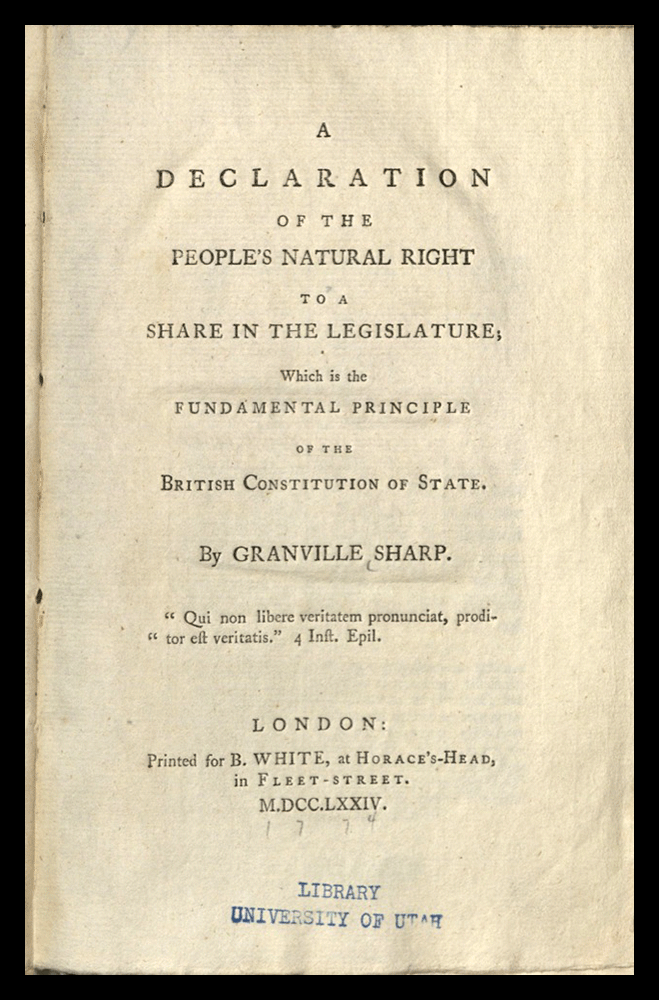
A DECLARATION OF THE PEOPLE'S NATURAL RIGHT TO A SHARE…
Granville Sharp (1735-1813)
London: Printed for B. White, 1774
DA507 1774 J48
Granville Sharp (1735-1813)
London: Printed for B. White, 1774
DA507 1774 J48
“The preamble to this act sets forth that commotions and insurrections, subversive of his majesty’s government, and destructive of the public peace, had been raised and fomented in Boston: that during the course of these insurrections, some valuable cargoes of tea belonging to the East India company had been destroyed: that while things continue in this situation, commerce cannot be safely carried on;…” – 1 March 1774 (regarding the Boston Port Bill)
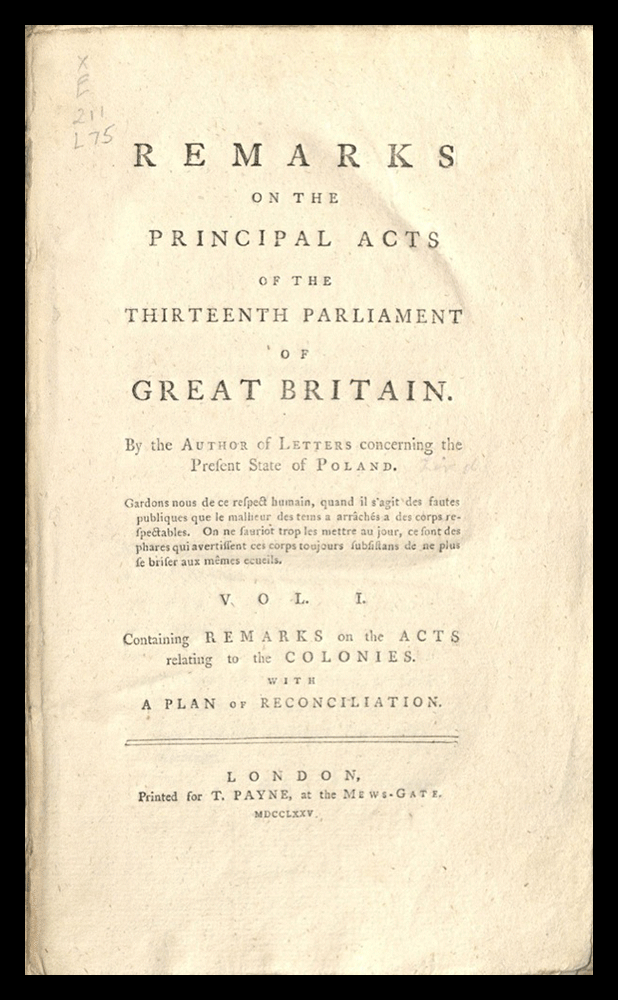
REMARKS ON THE PRINCIPAL ACTS OF THE THIRTEENTH…
John Lind (1737-1781)
London: Printed for T. Payne, 1775
E211 L75
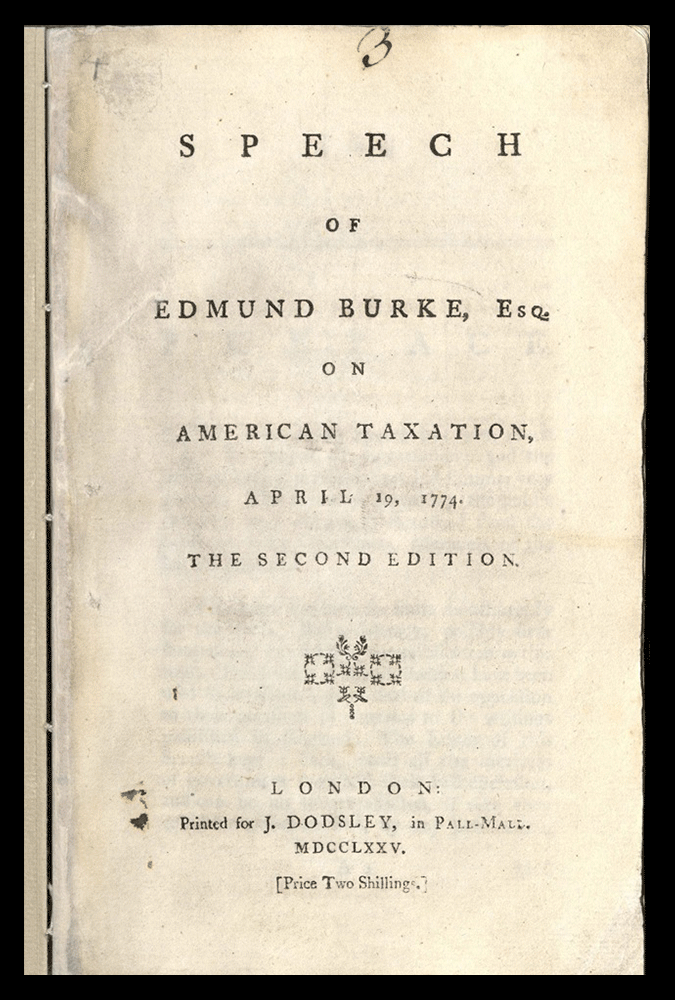
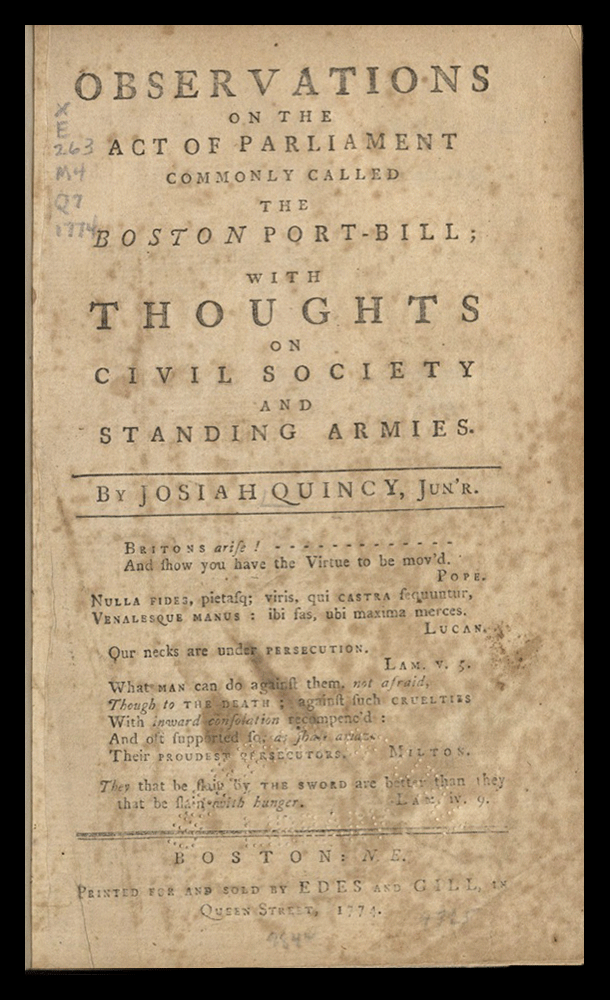
John Lind (1737-1781)
London: Printed for T. Payne, 1775
E211 L75
“When Parliament repealed the Stamp Act in the year 1776, I affirm, first, that the Americans did not in consequence of this measure call upon you to give up the former parliamentary revenue which subsisted in that Country; or even any one of the articles which compose it. I affirm also, that when, departing from the maxims of that repeal, you revived the scheme of taxation, and thereby filled the minds of the Colonist with new jealousy, and all sorts of apprehensions, then it was that they quarreled with the old taxes, as well as the new; then it was, and not till then, that they questioned all the parts of your legislative power; and by the battery of such questions have shaken the solid structure of this Empire to its deepest foundations.” – 19 April 1774

SPEECH OF EDMUND BURKE ... ON AMERICAN TAXATION…
Edmund Burke (1729-1797)
London: Printed for J. Dodsley, 1775
Second edition
E215.5 B915
Edmund Burke (1729-1797)
London: Printed for J. Dodsley, 1775
Second edition
E215.5 B915
“-Remember, that submission on to the yoke of bondage is the worst that can befall a people after the most fierce and unsuccessful resistance. What can the misfortune of vanquishment take away, which despotism and rapine would spare? It had been easy (said the great law-giver Solon to the Athenians,) to repress the advances of tyranny, and prevent it’s establishment, but now it is established and grown to some height it would be MORE GLORIOUS to demolish it. But nothing glorious is accomplished, nothing great is attained, nothing valuable is secured without magnanimity of mind and devotion of heart to the service. -- BRUTUS-LIKE, therefore, dedicate yourselves at this day to the service of your Country; and henceforth live A LIFE OF LIBERTY AND GLORY. … SPIRITS and GENII, like these, rose in Rome – and have since adorned Britain: such also will one day make glorious this more Western world. AMERICA hath in store her BRUTI and CASSII – her Hampdens and Sydneys – Patriots and Heroes, who will form a BAND OF BROTHERS: -- men who will have memories and feelings – courage and swords: -- courage, that shall inflame their ardent bosoms, till their hands cleave to their swords – and their SWORDS to their Enemies hearts.” – May 1774 (regarding the Boston Port Bill)

OBSERVATIONS ON THE ACT OF PARLIAMENT COMMONLY...
Josiah Quincy (1744-1775)
Boston, N.E.: Printed for and sold by Edes and Gill, 1774
First edition
E263 M4 Q7 1774
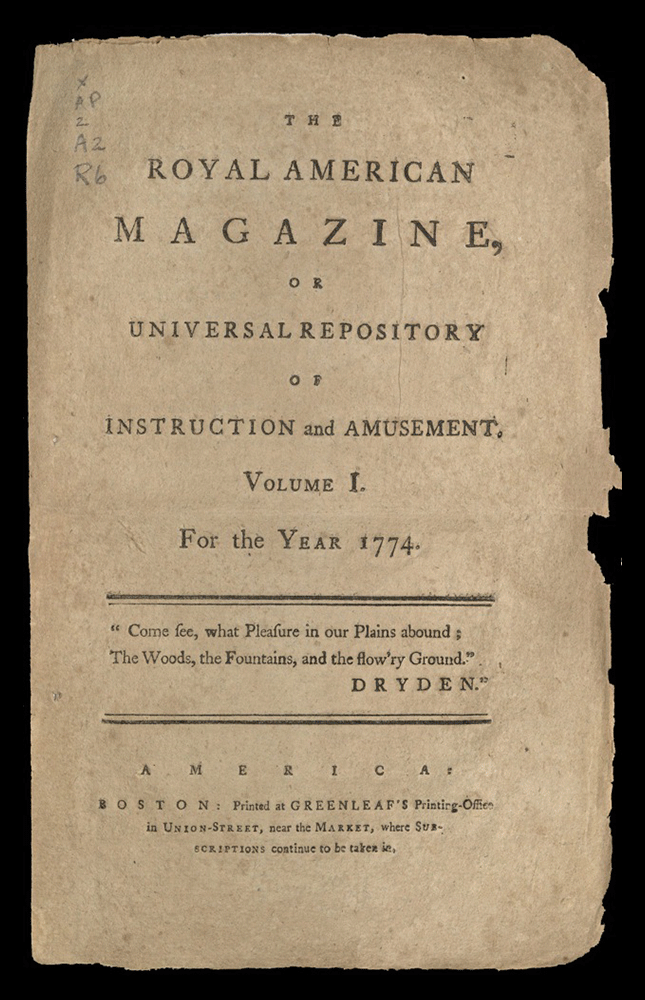
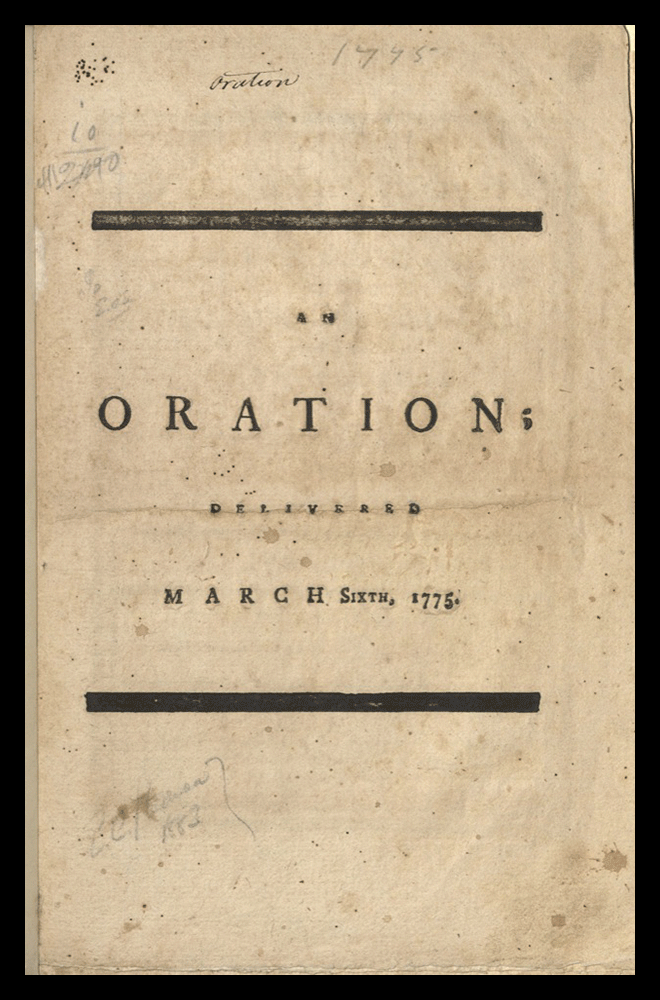
Josiah Quincy (1744-1775)
Boston, N.E.: Printed for and sold by Edes and Gill, 1774
First edition
E263 M4 Q7 1774
“There are two more cases, I would beg leave to mention, in which wars may be justified on equitable terms. --- The first is, when the subjects, or any considerable number of them, rebel against those rulers who act up to the spirit and original design of the constitution they are under. – The second is, when those who are in government violate the laws they had sworn to maintain, and attempt to oppress and enslave the people whom they had sworn to protect.” – June 1774, Extracts from an artillery election sermon preached by the Rev. John Lathrop…

ROYAL AMERICAN MAGAZINE, OR UNIVERSAL REPOSITORY...
Boston: Printed by and for I. Thomas, [etc., 1774-75]
AP2 A2 R6
Boston: Printed by and for I. Thomas, [etc., 1774-75]
AP2 A2 R6
“Even anarchy itself, that bugbear held up by the tools of power (though truly to be deprecated) is infinitely less dangerous to mankind than arbitrary government. Anarchy can be but of short duration; for when men are at liberty to pursue that course which is most conducive to their own happiness, they will soon come into it, and for the rudest state of nature, order and good government must soon arise. But tyranny, when once established, entails its curse on a nation to the latest period of time; unless some daring genius, inspired by Heaven, shall unappalled by danger, bravely form and execute the arduous design of restoring liberty and life to his enslaved, murdered country.”

AN ORATION DELIVERED MARCH 6, 1775, AT THE…
Joseph Warren (1741-1775)
Boston: Printed by Messieurs Edes and Gill, and by J. Greenleaf, 1775
E215.4 W2892
Joseph Warren (1741-1775)
Boston: Printed by Messieurs Edes and Gill, and by J. Greenleaf, 1775
E215.4 W2892
“But why should we enumerate our Injuries in detail? By one Statute it is declared, that Parliament can “of Right make laws to bind us in all Cases whatsoever.” What is to defend us against so enormous, so unlimited a Power? Not a single Man of those who assume it, is chosen by us, or is subject to our Controul or Influence: but, on the contrary, they are all of them exempt from the Operation of such Laws, and an American Revenue, if not diverted from the ostensible Purposes for which it is raised, would actually lighten their own burdens in proportion, as they increase ours. We saw the Misery to which such Despotism would reduce us. We for Ten Years incessantly and ineffectually besieged the Throne as Supplicants; we Reasoned, we Remonstrated with Parliament in the most mild and decent Language. But Administration, sensible that we should regard these oppressive Measures as Freemen ought to do, sent over Fleets and Armies to enforce them.” – 6 July 1775
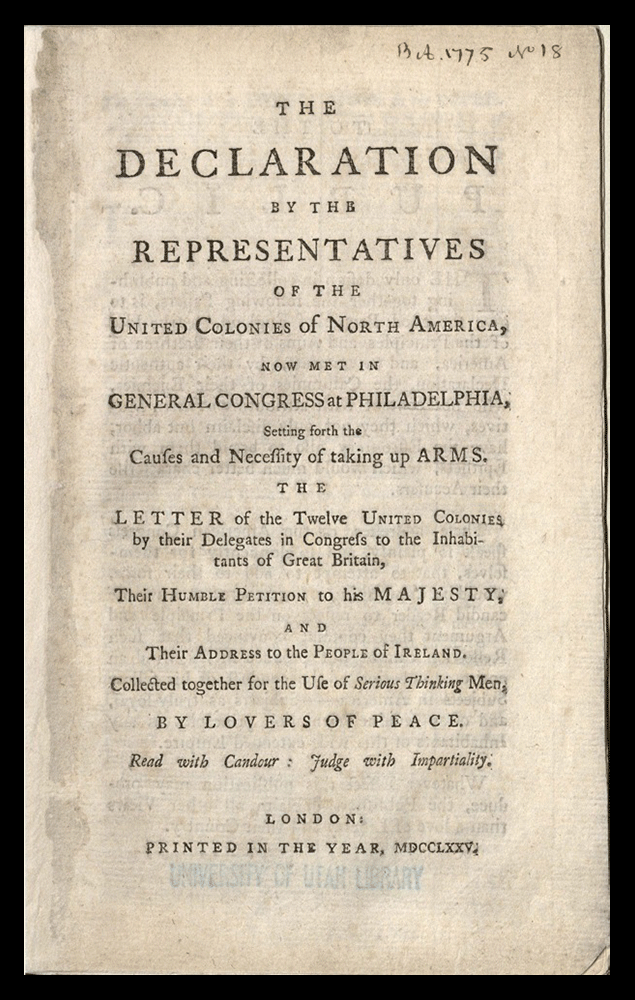
THE DECLARATION BY THE REPRESENTATIVES OF THE...
Continental Congress
London, 1775
J10 B75
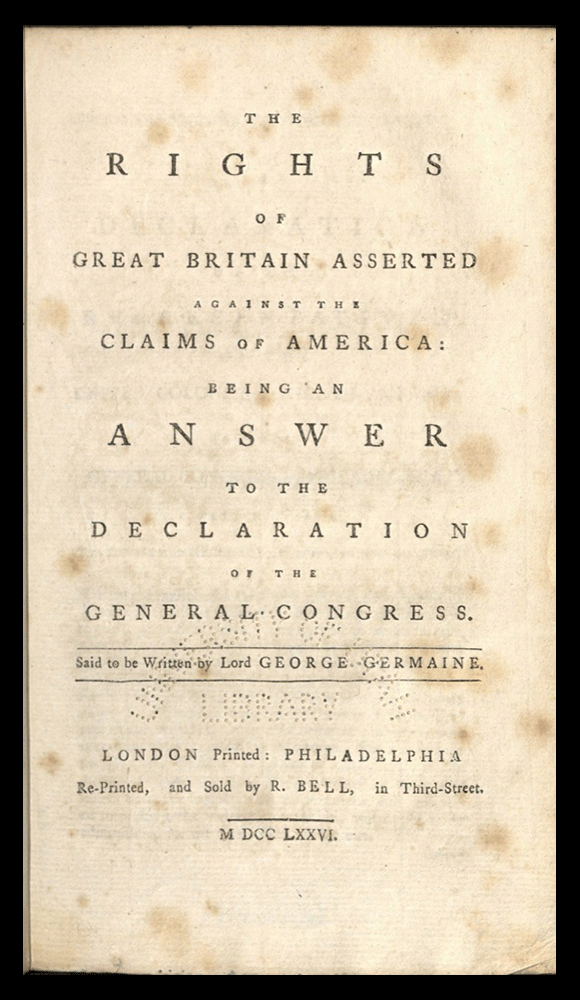
Continental Congress
London, 1775
J10 B75
“When Independent States take up arms, they endeavor to impress the World with a favorable opinion of their own cause, and to lay the blame of hostilities on the injustice of their Opponents. But if Nations, accountable to none for their conduct, deem it necessary to reconcile others to their proceedings, the necessity is still more urgent with regard to those who, breaking through every political duty, draw their swords against that State of which they own themselves the subjects. The opinions of mankind are invariably opposed to such men. Their assertions are heard with distrust, their arguments weighed with caution; and, therefore, it is as necessary for them to adhere to truth, in the former, as it is prudent to avoid sophistry in the latter.
This consideration however obvious it may appear to others, seems to have totally escaped the attention of the body of men who lately sat at Philadelphia under the name of “The general American Congress.”
This consideration however obvious it may appear to others, seems to have totally escaped the attention of the body of men who lately sat at Philadelphia under the name of “The general American Congress.”

THE RIGHTS OF GREAT BRITAIN ASSERTED AGAINST THE…
James Macpherson (1736-1796)
London: Printed; Philadelphia: Re-printed, and sold by R. Bell, in Third-street, MDCCLXXVI (1776)
E211 E179
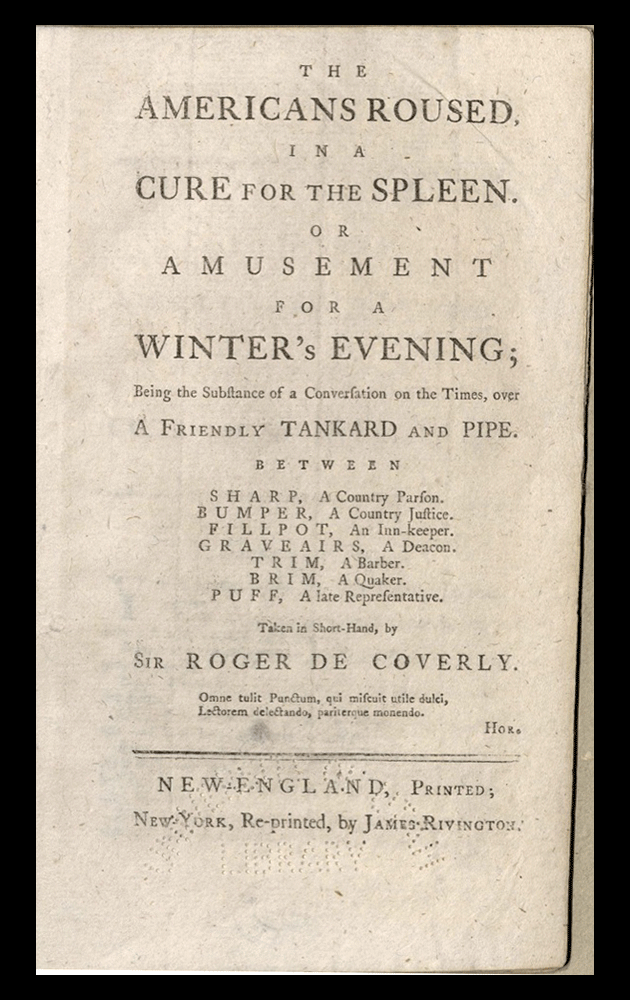
James Macpherson (1736-1796)
London: Printed; Philadelphia: Re-printed, and sold by R. Bell, in Third-street, MDCCLXXVI (1776)
E211 E179
“People have been gulled, imposed on, and misled long enough; it is high time for them to look about them; the night is far spent, the day is at hand – the day of reckoning – the day, when the friends and foes, the liege subjects, and the rebels and traitors, to George the Third, must be distinguished: And however speciously the leaders may flatter their blind followers with hopes of success in their opposition, by publishing extracts of letters from England, they may assure themselves there is not the least reason to suppose that parliament will not support their authority, even to the ruin of the present generation, in this and all the other colonies, if it can’t be established at a less expence: And it is as certain that submission is required only to save the honour of government; they never intend to tax us; they don’t wish to enslave us; they ahbor the thought; they want us to be happy and free; but no we forsooth, must quarrel for a shadow, under a moral certainty of losing the substance in the contest.”

THE AMERICANS ROUSED, IN A CURE FOR THE SPLEEN...
Roger De Coverly (1728-1796)
New England, printed in New York: Re-printed, by James Rivington, [1775]
E211 S51
Roger De Coverly (1728-1796)
New England, printed in New York: Re-printed, by James Rivington, [1775]
E211 S51
“We have thus seen the probable issue of hostile measures towards America. If we succeed, we are ruined. If we do not succeed – if by those extraordinary exertions which have often proceeded from people contending for their liberties, or by any of those accidents which have frequently decided the fate of battles and of empires, taking the victory from the strong and the race from the swift, we should be repulsed, to what a state of humiliation shall we be reduced! Such is the insufferable absurdity of the measure, that whether victors or vanquished, we are sure of being sufferers.”
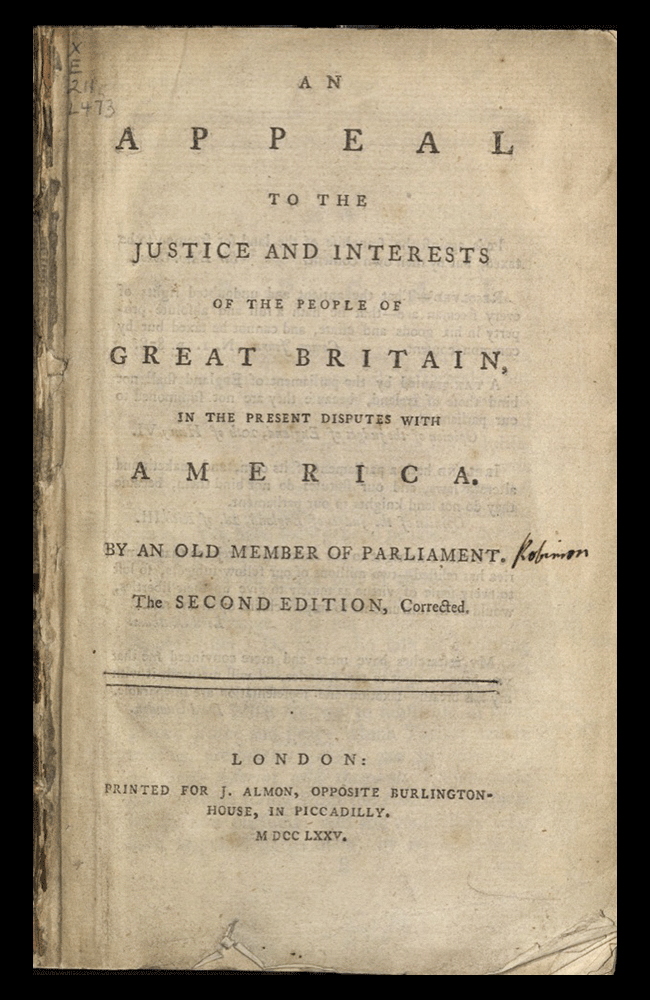
AN APPEAL TO THE JUSTICE AND INTERESTS OF THE…
Arthur Lee (1740-1792)
London: Printed for J. Almon, 1775
Second edition, corrected
E211 M13 1775
Arthur Lee (1740-1792)
London: Printed for J. Almon, 1775
Second edition, corrected
E211 M13 1775
“The anxious desire of preserving that harmony which had so long and so happily subsisted between the Parent State and her Colonies, occasioned the American to bear, with an almost blameable patience, the innovations which were continually made on their liberty, ’till the ministry, who imagined their moderation proceeded from ignorance and cowardice, by depriving them of almost every part of their rights which remained unviolated, have raised a spirit beyond the Atlantic, which may either recover the opportunities we have lost of restoring the breaches which for near a century have been making in our constitution, or of sinking us into the lowest abyss if national misery.”
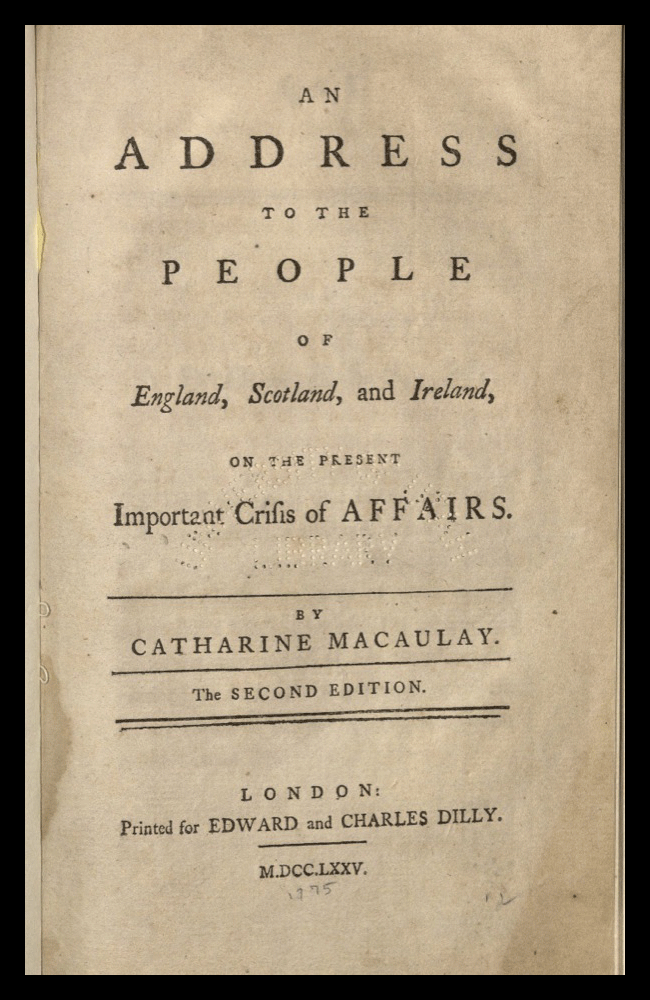
Catharine Macaulay (1731-1791)
London: Printed for E. and C. Dilly, 1775
Second edition
E211 M13 1775
London: Printed for E. and C. Dilly, 1775
Second edition
E211 M13 1775
“The proposition is Peace. Not Peace through the medium of War; not Peace to be hunted through the labyrinth of intricate and endless negotiations; not Peace to arise out of universal discord, fomented, from principle, in all parts of the Empire; not Peace to depend on the Juridical Determination of perplexing questions; or the precise marking the shadowy boundaries of a complex Government. It is simple Peace; sought in its natural course, and its ordinary haunts. – It is Peace sought in the Spirit of Peace; and laid in principles purely pacific. I propose, by removing the Ground of the difference, and by restoring the former unsuspecting confidence of the Colonies in the Mother Country, to give permanent satisfaction to your people; and (far from a scheme of ruling by discord) to reconcile them to each other in the same act, and be the bond of the very same interest, which reconciles them to British Government.” – 22 March 1775
Edmund Burke (1729-1797)
London: Printed for J. Dodsley, 1775
Second edition
E211 B97 1775
London: Printed for J. Dodsley, 1775
Second edition
E211 B97 1775
“HAVING never sold our birth-right, we considered ourselves entitled to the privileges of our father’s house – “to enjoy peace, liberty and safety”; to be governed, like our brethren, by our own laws, in all matters properly affecting ourselves, and to offer up our own sacrifices at the altar of British empire; contending that a forced devotion is idolatry, and that no power on earth has a right to come in between us and a gracious sovereign, to measure forth our loyalty, or to grant our property, without our consent". – 23 June 1775
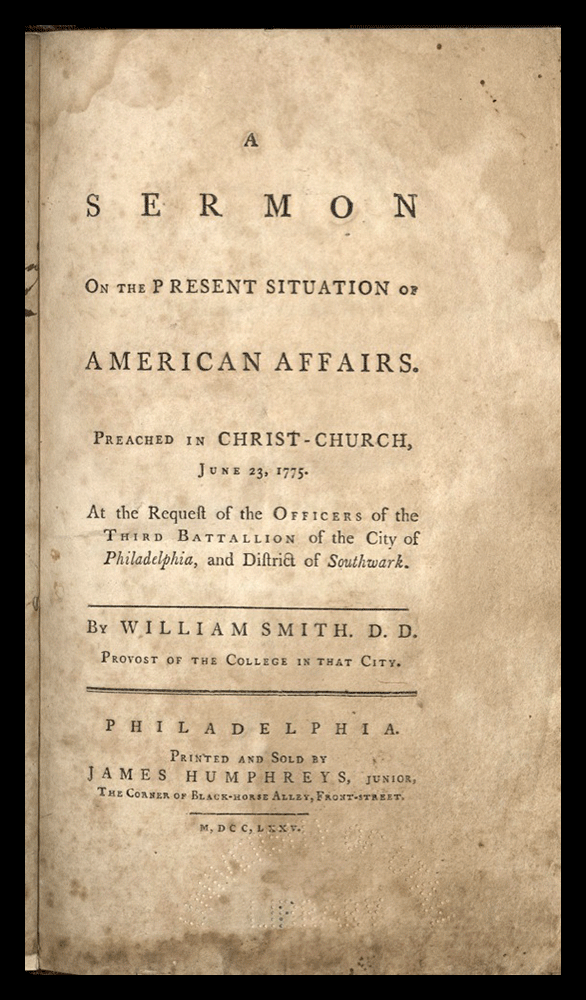
A SERMON ON THE PRESENT SITUATION OF AMERICAN…
William Smith (1727-1803)
Philadelphia: Printed and sold by James Humphreys, 1775
E297 S663
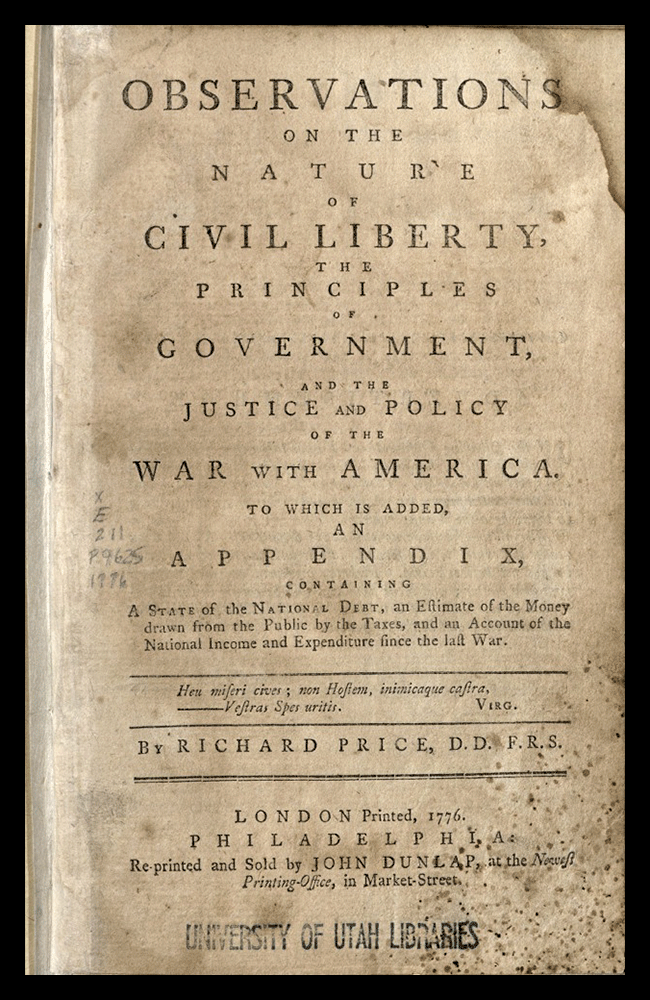
William Smith (1727-1803)
Philadelphia: Printed and sold by James Humphreys, 1775
E297 S663
“From what has been said, it is obvious, that all civil government, as far as it can be denominated free, is the creature of the people. It originates with them. It is conducted under their direction; and has in view nothing but their happiness.” – 8 February 1776

OBSERVATIONS ON THE NATURE OF CIVIL LIBERTY…
Richard Price (1723-1791)
London: Printed, 1776; Philadelphia: Re-printed and sold by J. Dunlap [1776?]
E211 P9625 1776
Richard Price (1723-1791)
London: Printed, 1776; Philadelphia: Re-printed and sold by J. Dunlap [1776?]
E211 P9625 1776
“The great Creator having design’d the human race for society, has made us dependent on one another for happiness; he has so constituted us, that it becomes both our duty and interest, to seek the public good. And that we may be more firmly engaged to promote each others welfare, the Deity has endowed us with tender and social affections, with generous and benevolent principles:…” – 29 May 1776
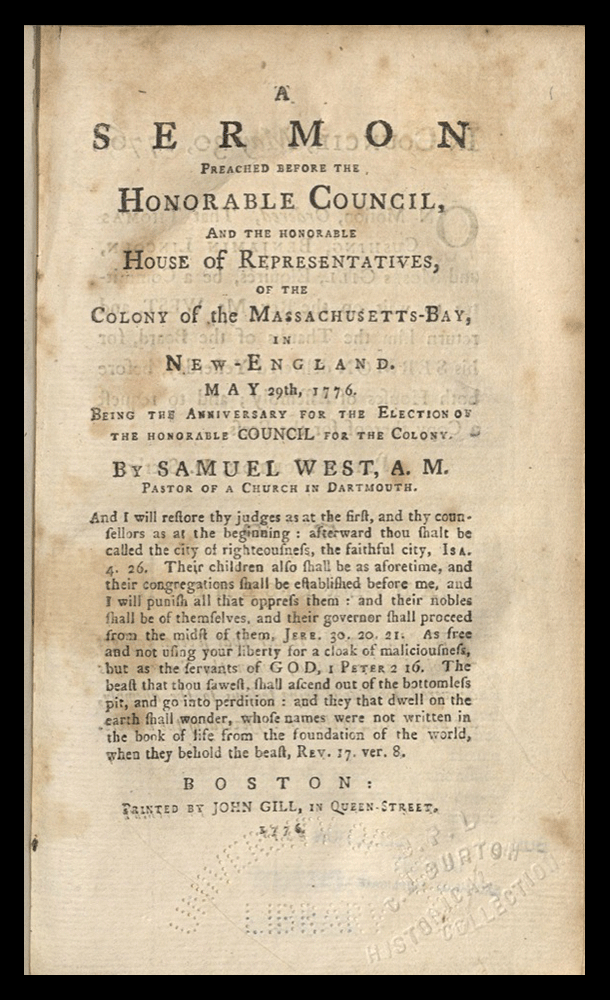
Samuel West (1731-1807)
Boston: Printed by John Gill, 1776
E297 W54
Boston: Printed by John Gill, 1776
E297 W54
“IN Fact, were Taxation and Representation so essentially connected, and so absolutely inseparable, as MR. LOCK and his Followers would make us believe; -- then most certainly every Man’s Consent [the Consent of every moral Agent of every Sex and Condition] ought to be previously obtained for divesting him, her, or them of any Part of his, her, or their natural Rights and Liberties in any Respect whatever. For indeed our personal Rights are nearer and dearer to us, and are more essentially our own [our own Property] than any adventitious Accession of Lands or Tenements, Goods or Chattels. Nay, in Fact without the former, it would be impossible either to acquire, to enjoy the latter.”
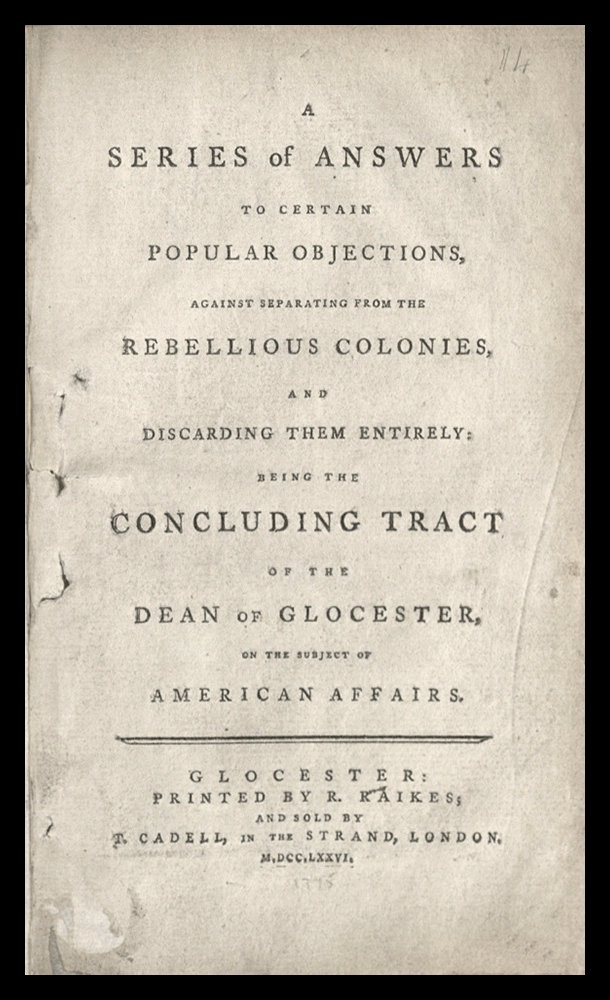
A SERIES OF ANSWERS TO CERTAIN POPULAR OBJECTIONS…
Josiah Tucker (1712-1799)
Glocester: Printed by R. Raikes, and sold by T. Cadell, London, 1776
E211 T925
“Society in every state is a blessing, but government even in its best state is but a necessary evil; in it’s worst state an intolerable one; for when we suffer, or are exposed to the same miseries by a government, which we might expect in a country without government, our calamity is heightened by reflecting that we furnish the means by which we suffer. – Government like dress, is the badge of lost innocence; the palace of kings are built on the ruins of the bowers of paradise. For were the impulses of conscience clear, uniform, and irresistibly obeyed, man would need no other lawgiver; but that not being the case, he finds it necessary to surrender up a part of his property to furnish means for the protection of the rest; and this he is induced to do by the same prudence which in every other case advises him out of two evils to choose the least. Wherefore, security being the true design and end of government, it unanswerably follows that whatever form thereof appears most likely to insure it to us, with the least expense and greatest benefit, is preferable to all others.”
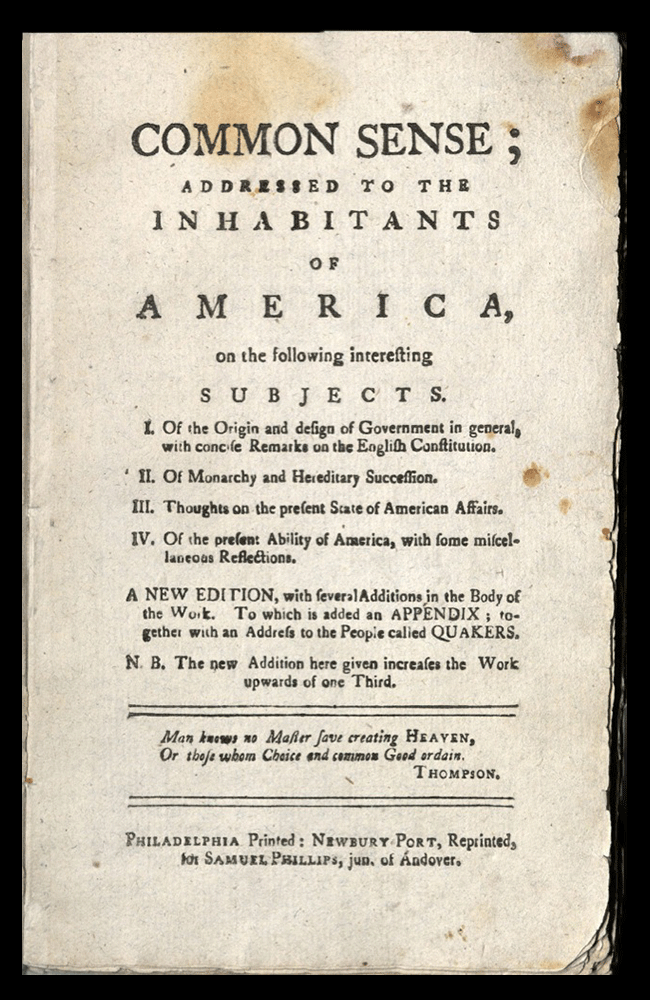
COMMON SENSE; ADDRESSED TO THE INHABITANTS OF...
Thomas Paine (1737-1809)
Philadelphia printed: Newbury-Port; Reprinted: for Samuel Phillips, jun. of Andover, [1776?]
Sixth printing?
E211 P124
Thomas Paine (1737-1809)
Philadelphia printed: Newbury-Port; Reprinted: for Samuel Phillips, jun. of Andover, [1776?]
Sixth printing?
E211 P124
“Besides the danger of an indefinite dependance upon an undetermined power, it might be worth while to consider what the characters are on whom we are so ready to acknowledge ourselves dependent. The votaries for this idol tell us, upon the good people of our Mother-Country, whom they represent as the most just, humane, and affectionate friends we can have in the world. Were this true, it were some encouragement; but who can pretend ignorance that these just and humane friends are as much under the tyranny of men of a reverse character as we should be, could these miscreants gain their ends? I distain any more than a mutual dependance on any man, or number of men, upon earth; but an indefinite dependance upon a combination of men, who have, in the face of the sun, broken through the most solemn covenants, debauched the hereditary, and corrupted the elective guardians of the people’s rights; who have, in fact, established an absolute tyranny in Great-Britain and Ireland, and openly declared themselves competent to bind the Colonists in all cases whatsoever: I say, indefinite dependance on such a combination of usurping innovators is evidently as dangerous as liberty, as fatal to civil and social happiness, as any one step that could be proposed, even by the destroyer of men.”
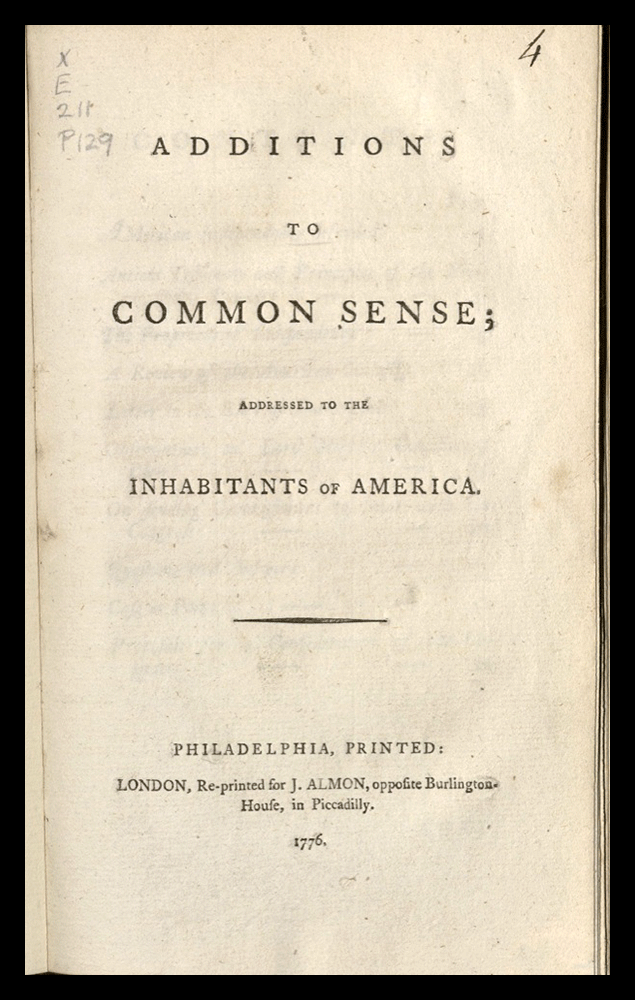
ADDITIONS TO COMMON SENSE…
Thomas Paine (1737-1809)
Philadelphia, printed; London: Reprinted for J. Almon, 1776
E211 P129
Thomas Paine (1737-1809)
Philadelphia, printed; London: Reprinted for J. Almon, 1776
E211 P129
“WHEN, in the course of human events, it becomes necessary for one people to dissolve the political bands which have connected them with another, and to assume among the powers of the earth the separate and equal station to which the laws of Nature and of Nature’s God entitle them, a decent respect to the opinions of mankind requires that they should declare the causes which impel them to the separation.
We hold these truths to be self evident; -- that all man are created equal; that they are endowed by their creator with certain unalienable rights; that among these are life, liberty, and the pursuit of happiness; that, to secure these rights, governments are instituted amoung men, deriving their just powers from the consent of the governed; and whenever any form of government becomes destructive of these ends, it is the right of the people to alter or to abolish it, and to institute new government , laying its foundations on such principles, and organizing its powers in such form as to them shall seem most likely to effect their safety and happiness….
We, therefore the representatives of the United States of America, in General Congress assembled, appealing to the Supreme Judge of the World for the rectitude of our intentions, do, in the name and by the authority of the good people of these colonies, solemnly publish and declare, That these United colonies are, and of right out to be, free and independent states…” – August 1776
We hold these truths to be self evident; -- that all man are created equal; that they are endowed by their creator with certain unalienable rights; that among these are life, liberty, and the pursuit of happiness; that, to secure these rights, governments are instituted amoung men, deriving their just powers from the consent of the governed; and whenever any form of government becomes destructive of these ends, it is the right of the people to alter or to abolish it, and to institute new government , laying its foundations on such principles, and organizing its powers in such form as to them shall seem most likely to effect their safety and happiness….
We, therefore the representatives of the United States of America, in General Congress assembled, appealing to the Supreme Judge of the World for the rectitude of our intentions, do, in the name and by the authority of the good people of these colonies, solemnly publish and declare, That these United colonies are, and of right out to be, free and independent states…” – August 1776
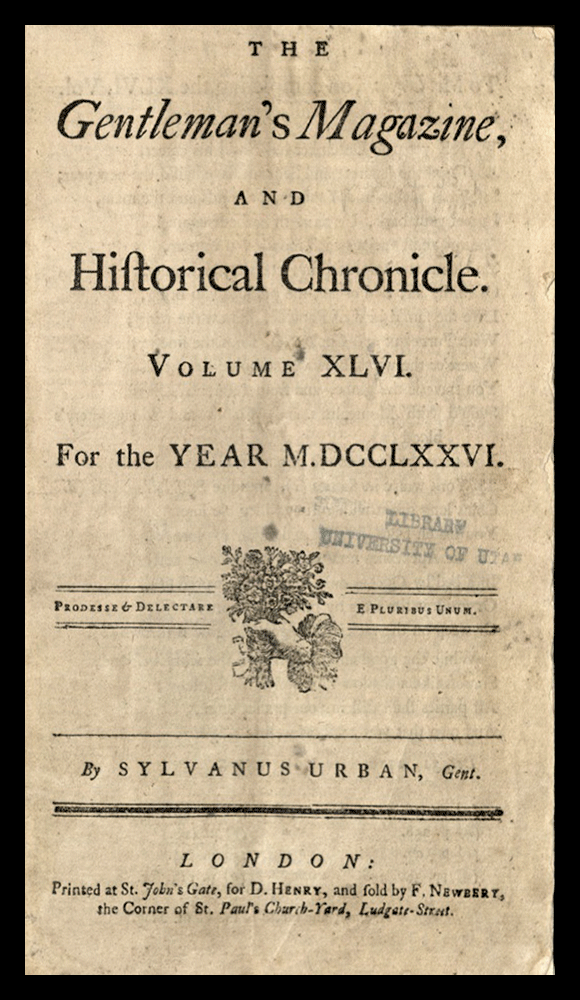
THE GENTLEMAN'S MAGAZINE…
London: E. Cave, 1736-1850
AP G3 v.46 1776
London: E. Cave, 1736-1850
AP G3 v.46 1776
“Thus a bad state of health caused by debauchery, specially warns the suffering person of the necessity of temperance in the indulgence of appetite. And the miseries of civil war, whether incurred by immoderate stretches of power on the one side, or produced by a wanton abuse of liberty on the other, are loud and particular calls to the correction to these enormities.
If this be a just representation, no christian can reasonably doubt that our present distressful and threatening circumstances in regard to America, ought to be thus viewed by every British subject on both sides of the Atlantic.” – 12 December 1776
If this be a just representation, no christian can reasonably doubt that our present distressful and threatening circumstances in regard to America, ought to be thus viewed by every British subject on both sides of the Atlantic.” – 12 December 1776
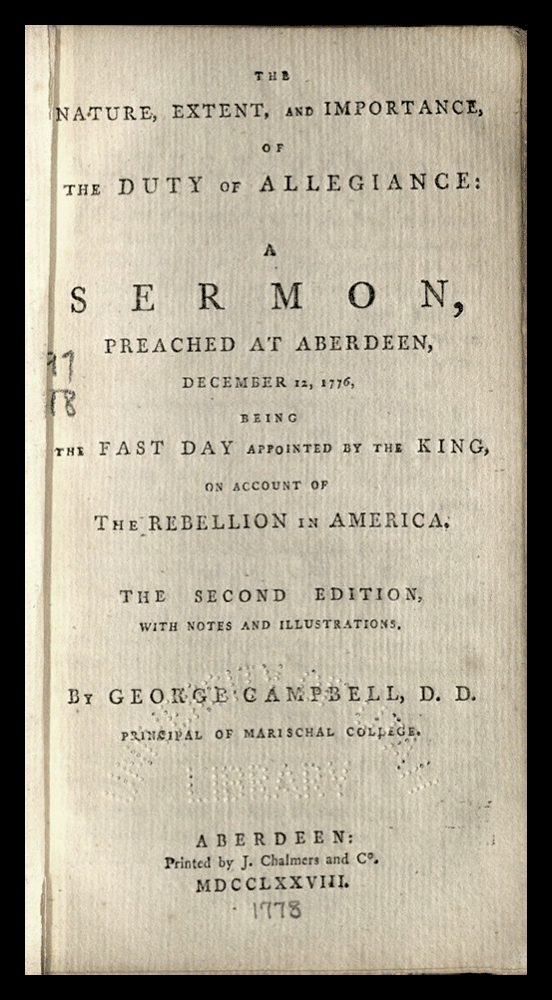
THE NATURE, EXTENT, AND IMPORTANCE, OF THE DUTY...
George Campbell (1719-1796)
Aberdeen: Printed by J. Chalmers and co., 1778
Second edition
E297 C18
George Campbell (1719-1796)
Aberdeen: Printed by J. Chalmers and co., 1778
Second edition
E297 C18
“Where are now the two or three hundred thousand men, that we were told would pour down upon us? But what if they did? What would a million do, if they ran away, as soon as the English appeared? Whatever they do, they will not fight. I believe they can- cannot; for the hand of God is upon them. But they can rob, and plunder, and destroy, and turn a well-peopled and fruitful land into a wilderness. They can burn houses, and drive men, women, and children into the wild woods, in the depths of winter. Yea, they can burn whole towns, without any regard to the sick or aged, that necessarily perish in the flame. But did not God regard them? Did not their dying cries enter into the ears of the Lord of Sabbaoth?
Such is the present state of affairs in America.”
Such is the present state of affairs in America.”
John Wesley (1703-1791)
London: Printed by R. Hawes, 1777
Second edition
E211 W465
London: Printed by R. Hawes, 1777
Second edition
E211 W465
“If I had not lived long enough to be little surprized at any thing, I should have been in some degree astonished at the continued rage of several Gentlemen, who, not satisfied with carrying fire and sword into America, are animated nearly with the same fury against those neighbours of theirs, whose only crime it is, that they have charitably and humanely wished them to entertain more reasonable sentiments, and not always to sacrifice their interest to their passion. All this rage against unresisting dissent, convinces me, that at the bottom they are far from satisfied they are in the right. For what is it they would have? A war? They certainly have at this moment the blessing of something that is very like one; and if the war they enjoy at present be not sufficiently hot and extensive, they may shortly have it as warm and as spreading as their hearts can desire.” – 3 April 1777
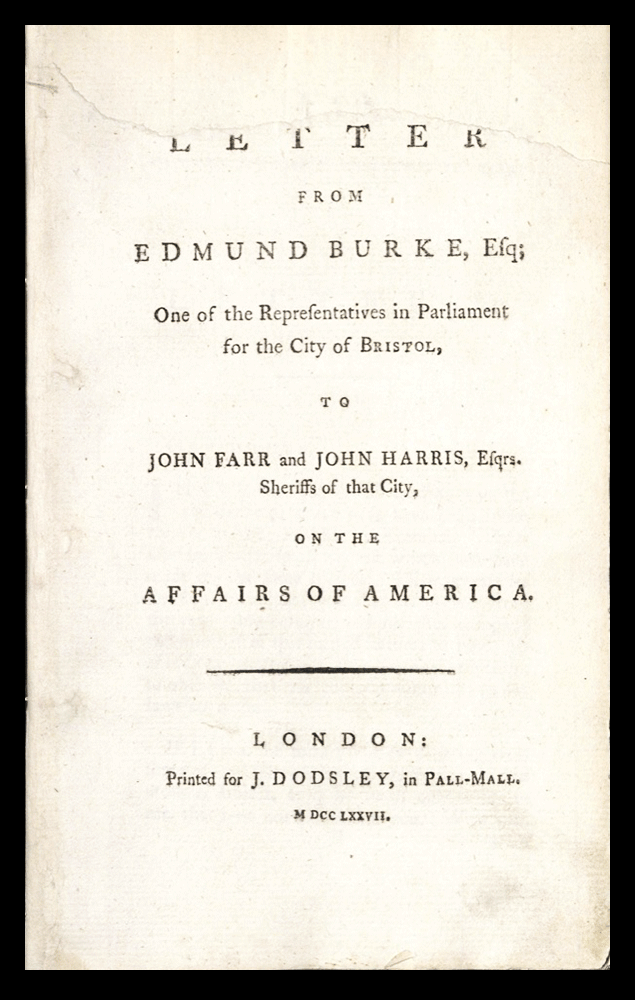
A LETTER FROM EDMUND BURKE, ESQ…
Edmund Burke (1729-1797)
London: Printed for J. Dodsley, 1777
E211 B94
Edmund Burke (1729-1797)
London: Printed for J. Dodsley, 1777
E211 B94
“Upon the whole, when I perceive a war, and such a war too, so weakly supported, and yet so violently pursued; when I find the most elevated of the Church, preaching and publishing to the world passive obedience and non-resistance to the supremacy of Law, whether that Law be right or wrong, whether it be good or bad, whether it be to establish Popery or Protestantism, whether it be enacted by an honest, or by a corrupt and abandoned Parliament; when I see men that were pillored in the reign of good George II. pensioned in this, and for the same reasons; when I hear of others hired to root out the very idea of public virtue from the minds, and tear benevolence from the hearts of Englishmen; when I reflect, but why add more to the black catalogue of public dangers? it is time to look at home: it is time, even with Stentorian voice, to call for union among the Friends of the Constitution; it is time that private opinion should yield to public safety: it is time that we should both “watch and ward,” for if the liberties of our fellow-subjects in America are to be taken from them, it is for the ideot only to suppose that we can preserve our own. The dagger uplifted against the breast of America, is meant for the heart of Old England.”
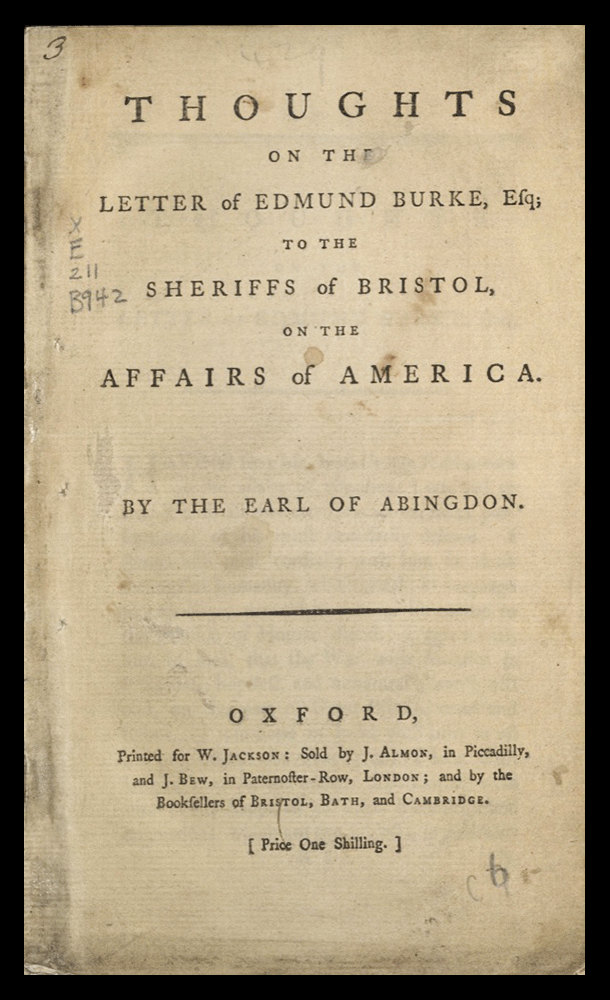
THOUGHTS ON THE LETTER OF EDMUND BURKE, ESQ…
Willoughby Bertie Abingdon (1740-1799)
Oxford: Printed for W. Jackson, 1777
E211 B942
“THE portals of the temple we have raised to freedom, shall then be thrown wide, as an asylum to mankind. America shall receive to her bosom and comfort and cheer the oppressed, the miserable and the poor of every nation and of every clime. The enterprise of extending commerce shall wave her friendly flag over the billows of the remotest regions. Industry shall collect and bear to her shores all the various productions of the earth, and all by which human life and human manners are polished and adorned. In becoming acquainted with the religions, the customs and the laws, the wisdom, virtues and follies and prejudices of different countries, we shall be taught to cherish the principles of general benevolence. We shall learn to consider all men as our brethren, being equally children of the Universal Parent – that God of the heavens and of the earth, whose infinite majesty, for providential favor during the late revolution, almighty power in our preservation from impending ruin, and gracious mercy in our redemption from the iron shackles of despotism, we cannot cease with gratitude and with deep humility to praise, to reverence and adore.”
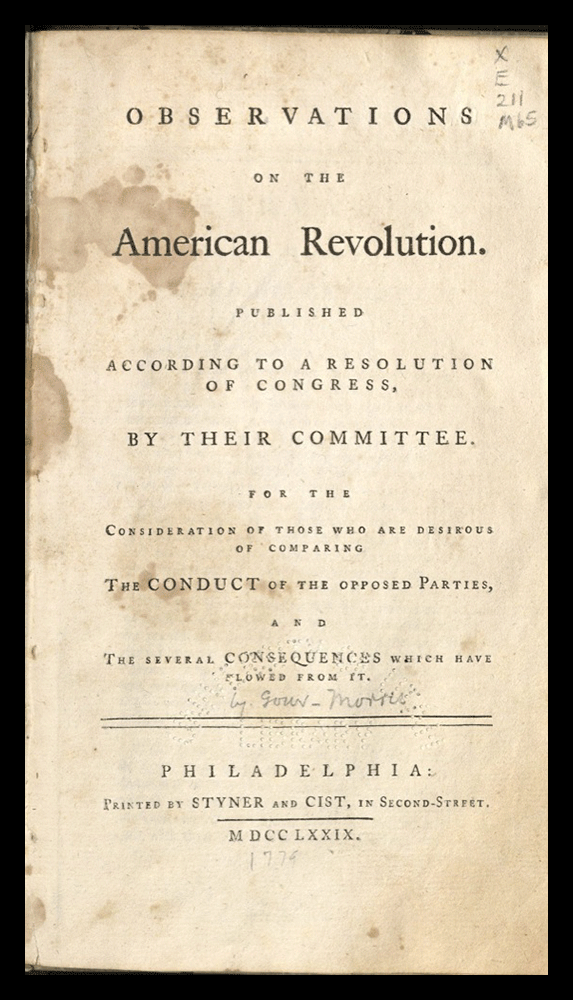
OBSERVATIONS ON THE AMERICAN REVOLUTION…
Gouverneur Morris (1752-1816)
Philadelphia: Printed by Styner and Cist, 1779
E211 M65
“The consequences of this man’s unaccountably weak and wretched conduct are, thirty thousand brave men destroyed, thirty millions of money expended; thirteen provinces lost; and a war with the House of Bourbon.
If such misconduct is to pass without censure or punishment, there must be a radical weakness, either in the constitution of the state, or in the minds of the people, and the total dissolution of this empire must be fast approaching: for the people who sit in patient stupidity, and see themselves become the victims of ignorance or treachery, cannot, and do not deserve to exist as a nation.”
If such misconduct is to pass without censure or punishment, there must be a radical weakness, either in the constitution of the state, or in the minds of the people, and the total dissolution of this empire must be fast approaching: for the people who sit in patient stupidity, and see themselves become the victims of ignorance or treachery, cannot, and do not deserve to exist as a nation.”
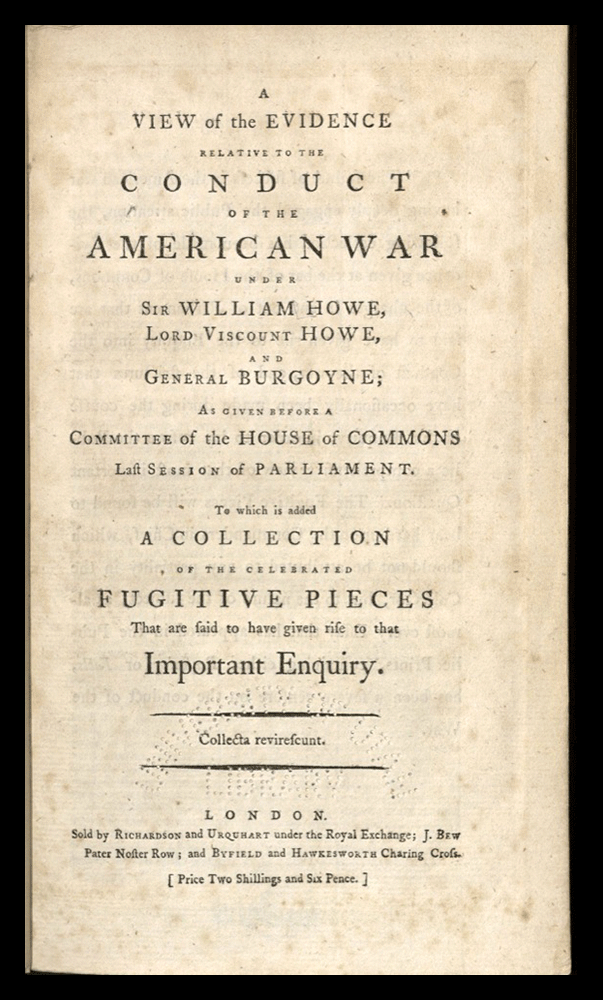
London: Sold by Richardson and Urquhart, 1779
E230 V67
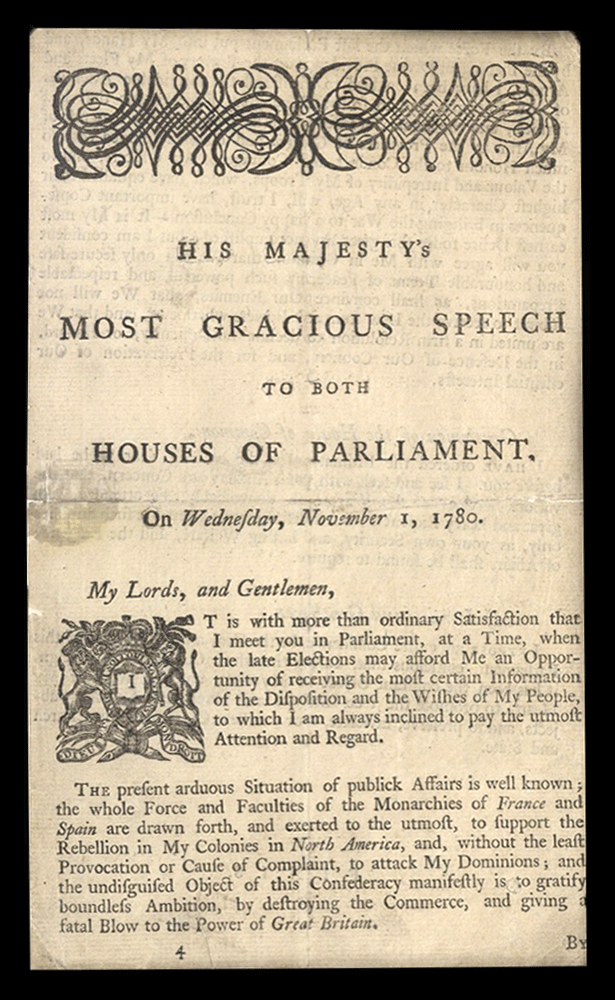
E230 V67
“By the Force which the last Parliament put into My Hands, and by the Blessings of Divine Providence on the Bravery of My Fleets and Armies, I have been enabled to withstand the formidable Attempts of My Enemies, and to frustrate the great Expectations they had formed; and the signal Successes which have attended the Progress of My Arms in the Provinces of Georgia and Carolina, gained with so much Honour to the Conduct and Courage of My Officers, and to the Valour and Intrepidity of My Troops, which have equalled their highest Character in any Age, will, I trust, have important Consequences in bringing the War to a happy Conclusion. –It is My most earnest Desire to see this great End accomplished; but I am confident you will agree with Me in Opinion, that We can only secure safe and honourable Terms of Peace by such powerful and respectable Preparations, as shall convince Our Enemies, that We will not submit to receive the Law from Powers whatsoever, and the We are united in a firm Resolution to decline no Difficulty, or Hazard, in the Defence of Our Country, and for the Preservation of Our essential Interests.” – 1 November 1780

HIS MAJESTY'S MOST GRACIOUS SPEECH TO BOTH HOUSES…
King George III (1738-1820)
London?: s.n., 1780?
DA510 A14 1780
King George III (1738-1820)
London?: s.n., 1780?
DA510 A14 1780
